Gelato Auto Cannabis Strain Week-by-Week Guide

- 1. Grow specifications
- 2. Grow set up
- 2. a. Grower a: canamatoes
- 2. b. Grower b: luv2grow
- 2. c. Grower c: zenithknadir
- 2. d. Grower d: truenorth
- 3. Germination and seedling stage | week 1
- 4. Early veg | week 2
- 5. Mid veg | weeks 3-4
- 6. Transition (pre-flower) | week 5
- 7. Early flower | weeks 6-7
- 8. Mid flower (bulk phase) | weeks 8-9
- 9. Ripening and harvest | week 10 (and beyond)
- 10. The outcome
- 10. a. Gelato auto yield
- 10. b. Gelato auto smoke report
- 11. In conclusion
- 12. External references
The highest THC level is still the most sought-after characteristic among growers, and Gelato Auto is the most potent autoflower in FastBuds collection! And while people choose this strain for its THC content, they also come back for its flavor which often resembles ice cream.
In our Gelato Autoflower week by week guide, we’ll acquaint you with a cultivar that is lab-tested 26% THC and boasts the smell and taste of sweet cookies, citrus, and other exotic fruit. You’ll learn the timeline of growing this strain as you watch her progress through four individual grow cycles.
1. Grow Specifications
Gelato Auto growth is characterized by a great hybrid vigor which allows you to start training this strain at a young age and turn her into a sizable bush with multiple side branches. But even if you let Gelato Auto grow naturally, she forms an almost flat multi-branch canopy just the same. This means a comfortable height of only 70–100 cm (28–40 inches), perfect for an indoor garden or stealthy cultivation outdoors. On the other hand, many branches mean many bud sites and the corresponding yields of 400–550 gr/m2 (1.3–1.8 oz/ft2).
Gelato Auto also responds extremely well to low-stress training. This incredibly effective technique takes almost no toll on plants whatsoever. It simply involves using soft garden ties or wire to tie growing shoots down to the rim of the pot, placing them parallel to the soil below. This prevents plants from growing in their traditional vertical pattern and instead forms a flatter and more even canopy. This comes with a host of benefits when growing Gelato Auto with the aim of achieving the best results possible. First of all, you’ll end up with bigger yields! Because LST spreads out the canopy, you won’t end up with one large central cola and lots of other small buds. Instead, all of your flowers will receive equal light exposure, resulting in many uniform and evenly-sized inflorescences. LST also has a protective effect on flowers. Paired with adequate defoliation, it creates more aeration in the canopy which helps to stop mold from forming on buds.
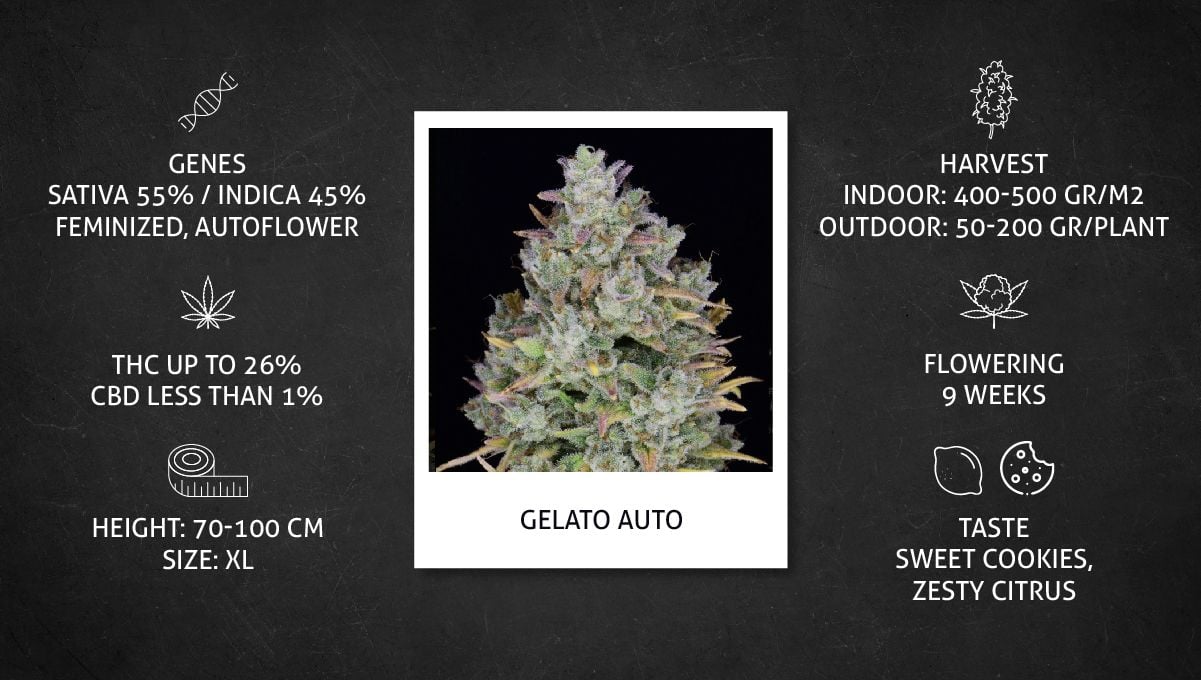
This may be not a record-breaker among FastBuds genetics, but an incredible result for a 55% Sativa autoflower. The flowering time can be as short as 9 weeks from seed to harvest although much depends on the conditions and whether you’re willing to wait longer for bigger and heavier buds.
Gelato Auto is also one of the ‘whitest’ strains you can grow. Any time you see a trichome density like this, you know you’re in for a good time! After all, these small structures are the biofactories of cannabis plants. They contain pathways that make all of the cannabinoids and terpenes that underpin the effects of each cannabis strain. However, trichome density also benefits plants themselves, especially those that are growing outdoors.
The phytochemicals secreted by trichomes are made to protect plants against both abiotic (non-living) and biotic (living) sources of stress. They work as chemical defences against diseases, insects, predators, and even the UV rays emitted by the sun. The thick fur of trichomes is chock-full of cannabinoids (26% THC) and terpenes which give the smoke an almost syrupy sweetness with a flavor of cookie dough, citrus, and other fruits, and some earthy notes.
2. Grow Set Up
Thanks to the GrowDiaries community, we now can obtain reliable information about virtually any weed variety. As for the FastBuds strains, there are literally hundreds of well-documented grow cycles for each one. We have chosen those that are complete, detailed, and have many pictures—to give you the exact idea of Gelato Autoflower week by week progress from seed to harvest.
Grower A: Canamatoes
Canamatoes joined the GrowDiaries community only 10 months ago, but he has managed to publish 17 reports and get 2826 likes. All this has already earned him the title of a Master. He even got a trophy—a 3rd place in the Fast Buds Best Strain Presentation Video Contest—for the Gelato Auto grow that we are going to review here.
He uses several tents—the smallest being a 3’x3’ one—but for this run he assembled a larger, 4’x5’ tent. This was a lucky decision because his Gelato Auto grew HUGE.
In this tent, the guy has installed a Mars Hydro TSW 2000 LED that draws 300W from the socket. This quantum board is supposed to be perfect for a 3’x3’ space (90x90cm) during different stages of flowering and for up to 4’x4’ in the vegetative phase and the pre-flowering stage. However, as we shall see, the light did great covering even a large area.
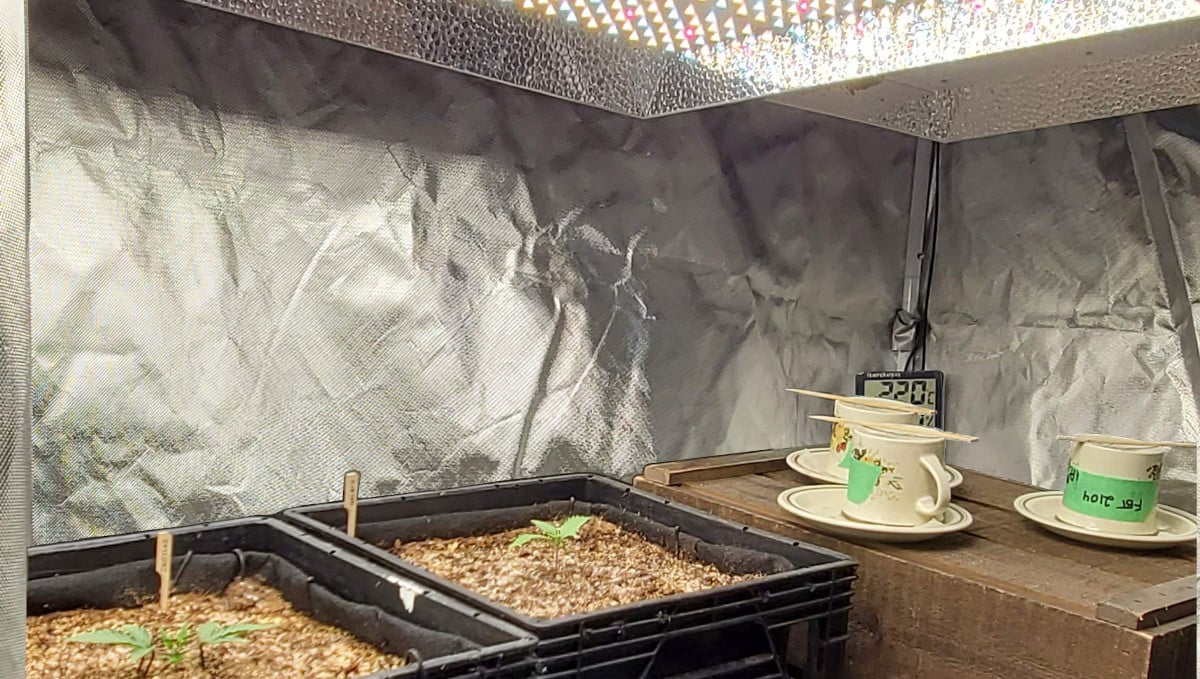
A 4’x5’ tent is big enough to be a walk-in space and even fit a chair for the gardener to sit while training his flowers. (Which we’ll see a lot of.) He also played music for his marijuana 24/7, believing that it would help his garden grow.
Grower B: Luv2Grow
Luv2Grow is a veteran on GrowDiaries where he’s been sharing his reports for 2 years and 5 months. He’s been using a 2’x4’ grow tent with a total surface area of 8 ft2 (0.74 m2). This is enough to fit in one row of 3 autoflowers in 3-gallon fabric pots for each run.
He has hooked up 4 LEDs which draw about 220W each (880W in total). For ventilation the guy uses an 8” exhaust fan and a 6” intake fan. He’s not crazy about his fans though because he suspects the six-inch intake fan doesn’t keep up with a more powerful exhaust fan. He likes to grow his autoflowers in a soil mix that has 3 parts organic compost, 3 parts peat moss, 2 parts perlite, and 1 part vermiculite — all from Home Depot. For his fertigation needs, he uses tap water which is run through a home filtration system.
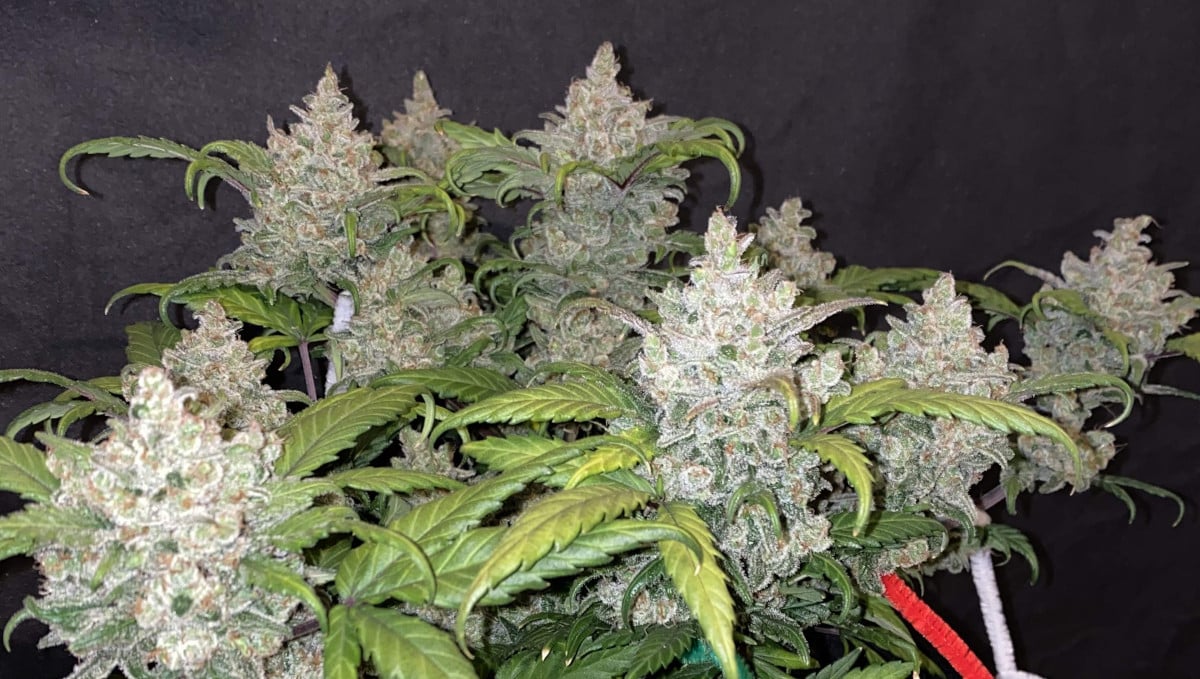
The guy hasn’t shared a single photo of his setup, so let’s admire instead his Gelato Auto pictured OUTSIDE the tent.
Grower C: Zenithknadir
The rating system on GrowDiaries gives zenithknadir the title of an Apprentice although the guy grows like a pro. He registered almost 3 years ago and has so far completed 3 runs.
He even finished 10th in the Diary of the Month July 2019 with FastBuds Lemon AK. Interestingly, the prize for that win was the Gelato Auto seed whose progress we shall follow in the present review.
Some of his pictures reveal a lot of third-world, Eastern Bloc type of poverty, and his grow space is extremely low budget. He has fashioned a tent out of 1”x2” furring strips and a sheet of white material, not even mylar. There’s no hinged door, just another wall which is removed when there’s a need to look at the plants or tend to them.
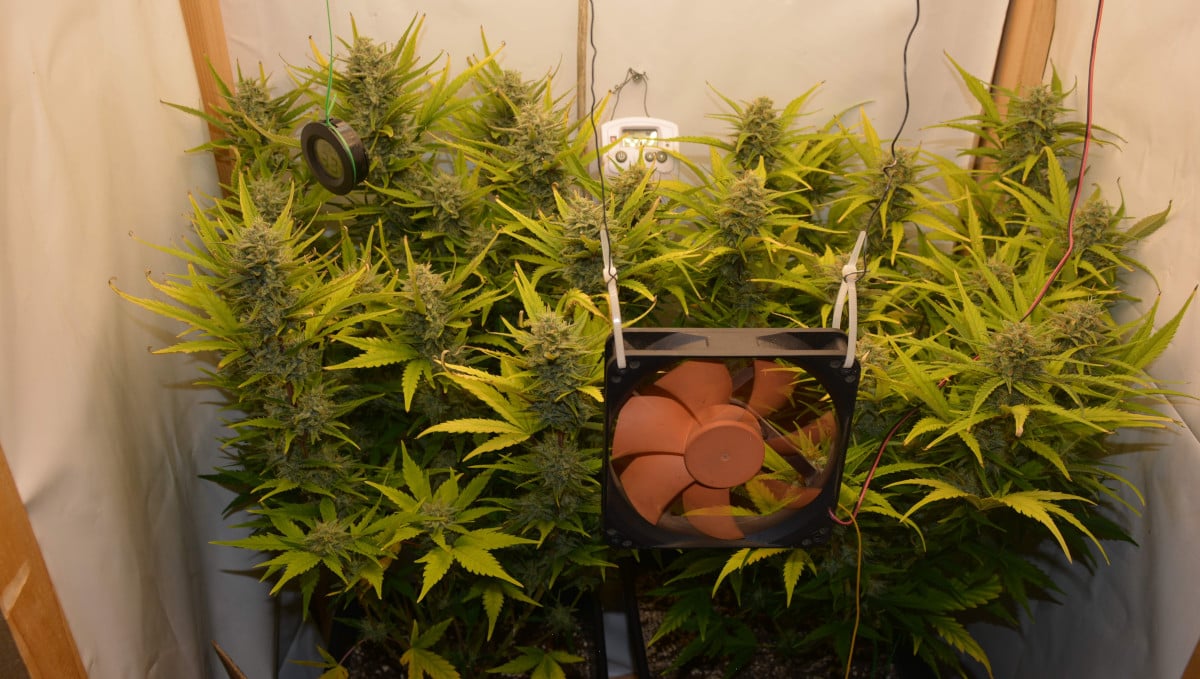
In this tight, 50cm x 65cm space, the gardener has installed a 160W DIY LED light and grows two autoflowers at a time. He routinely harvests more than gram per watt.
Grower D: TrueNorth
It’s been two years since TrueNorth joined the GrowDiaries community. He started strong, scoring second in the Newbie of the Month contest of September 2019. He also took the 1st place for the Pets & Pot Contest 2020 by FastBuds (see the pic below). Somehow, the guy is still an Apprentice, but he’s showing a lot of talent and skill, and the plants he harvests look jaw-dropping gorgeous.
He uses a spacious 5’x5’ Gorilla tent that has enough room for several trained and sprawling autoflowers grown at the same time. For veg and the pre-flowering stage, he turns on two Budget LED Grow Lights drawing 250W each, and adds a third one when the flowering kicks in because autoflower flowering stages require more light.
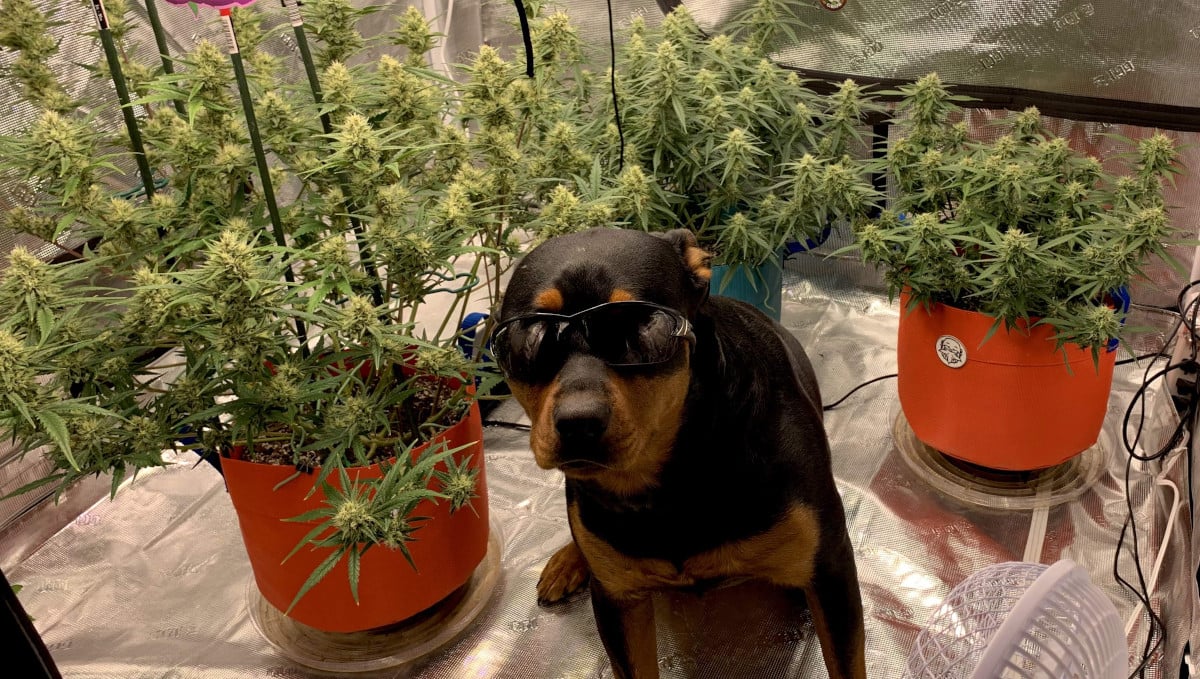
These full-spectrum boards have some red LEDs mixed in and give off a blend of wavelengths perfect for cannabis cultivation. The US-based producer of these lights doesn’t even pretend that their products are meant for some other plant. With lighting like this, there are usually no issues with ventilation because there’s not much heat to extract. However, the grower didn’t cut corners and installed a powerful AC Infinity Cloudline T6 inline duct fan.
In the table below, you can compare the grow room size, the wattage, and the type of lights used in each of the gardens:
| Grower | Grow Room | Watts Used | Type of Light | Brand |
|---|---|---|---|---|
| A | 4'x5' | 300W | LED | Mars Hydro TSW 2000 |
| B | 2'x4' | 880W | LED | Custom |
| C | 50 x 65 cm | 160W | LED | DIY |
| D | 5'x5' | 750W | LED | Budget LED Grow Lights |
3. Germination And Seedling Stage | Week 1
This is arguably the most nerve-racking of grow stages if you are a newbie gardener, but the four members of our review knew what they were doing and ensured their ladies a perfect start. Only one grower failed to remove the shell from the sprout soon enough, and this somewhat messed up his Gelato Auto timeline.
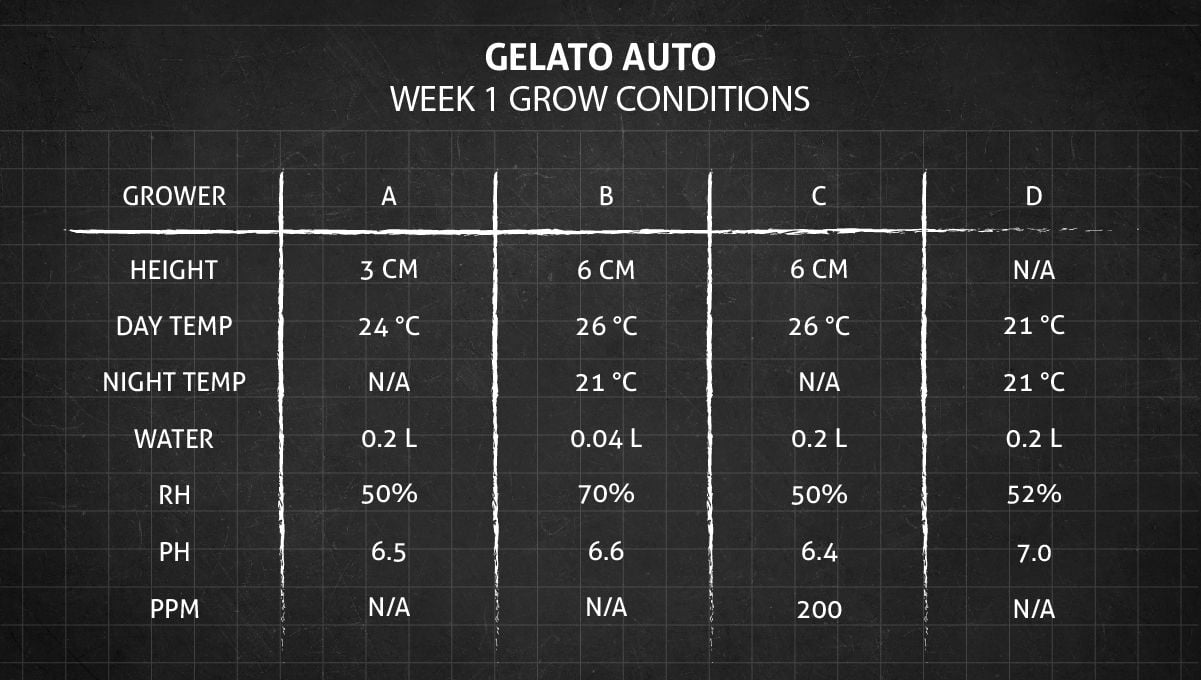
A: First Days in Her Oversized Boxy House
This Gelato Auto was germinated using one the most common germination methods. One seed was soaked for 8 hours in a cup of water (where it cracked), then put for another 10 hours between paper towels, and finally planted a quarter inch down into a 7-gal fabric pot filled with Pro-Mix HP.
Pro-Mix HP is a soilless mix that consists of fibrous peat moss and a greater than usual quantity of perlite. This increases the porosity of the medium and the oxygenation of the root zone. On the other hand, the water retention gets lower. Or so says the manufacturer.
As we shall see, the grower didn’t have to fertigate especially often: once every few days in the beginning of the life cycle and every other day in the flowering stage.
The seedling was covered with a humidity dome until it popped up. Btw, the grower put his growbag into a milk crate and used other crates for support.
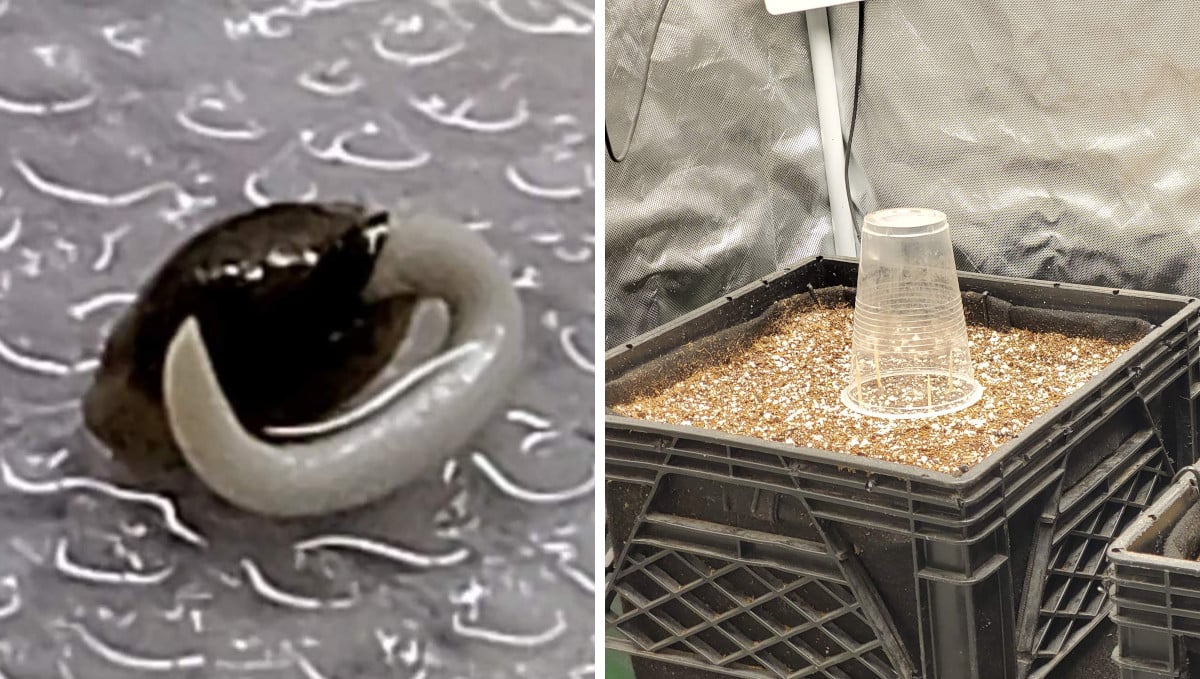
Before it emerged and for the first week of growth, the seedling got alternately dechlorinated pH’d water and Real Growers Recharge which is a rich blend of natural products, such as kelp, molasses, and humic acids, and contains a lot of beneficial microbes. With Recharge, seedlings absorb nutrients better and develop faster. The grower poured water both on the seed/seedling itself and around the perimeter—to raise the humidity.
Gelato Auto emerged fast and looked great, and on day 6 she received her first meal of Greenleaf Nutrients Mega Crop. It is that rare type of product that is a 1-part formula and can be used throughout the whole life cycle.
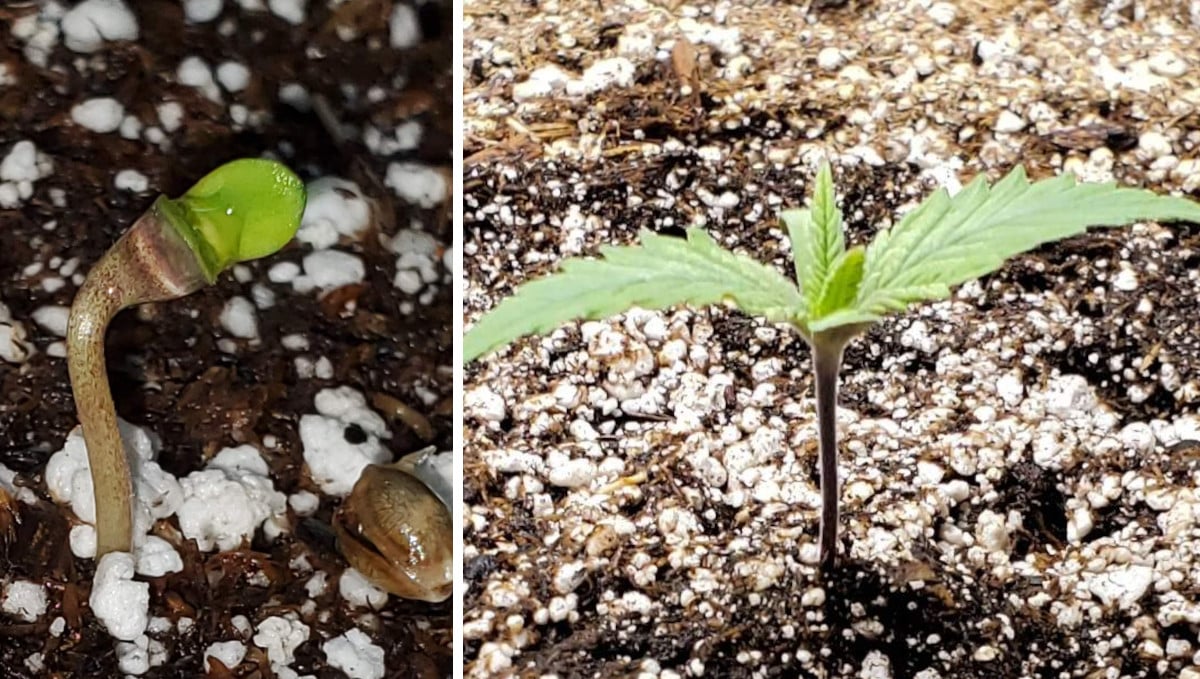
B: Easy Does It
The grower put one Gelato Auto seed between wet paper towels sandwiched together inside a ziplock. The very next day, it cracked open and poked a tail, and on day 2 the taproot was long enough to put the seed in a jiffy pellet to sprout.
When this happened, the pellet was transferred into a solo cup. For the following two weeks, the guy would debate whether to keep the plant in the solo cup till harvest or to transplant her into a bigger pot. He would eventually choose the second option.
The leaves were slightly yellow for the first couple of days. Probably, because of ventilation issues. Keeping the tent slightly open increased the airflow, and by the end of the first week, Gelato Auto had a healthy green color.
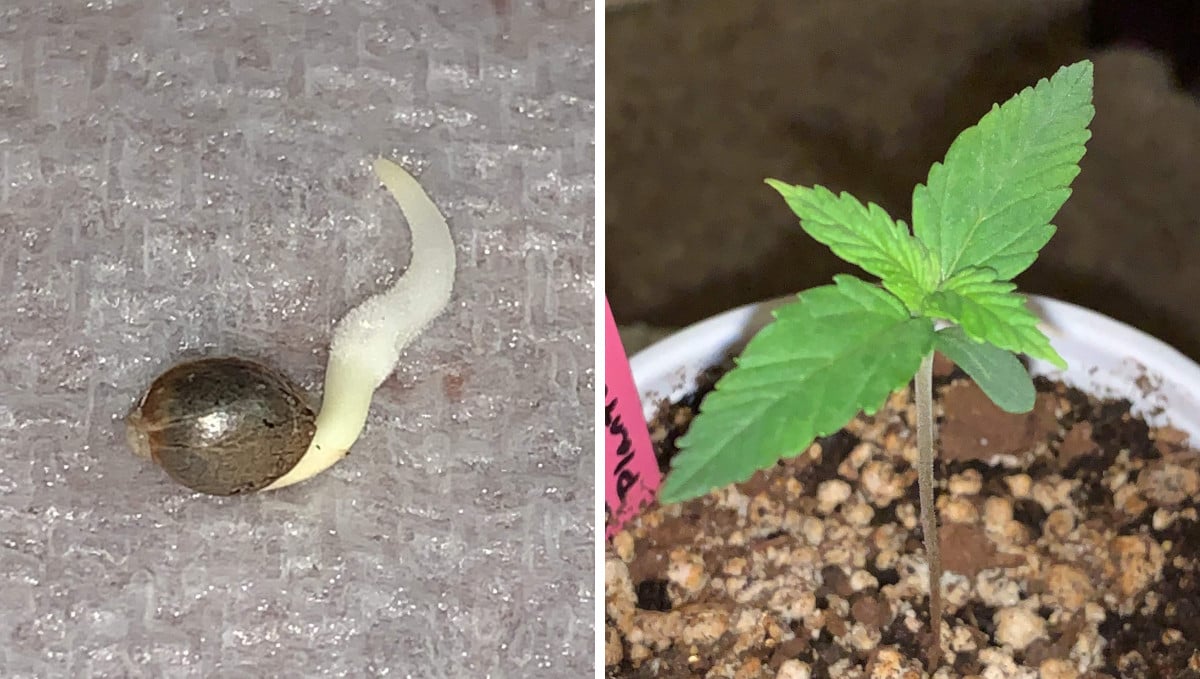
She was getting basically fresh water so far, with just a small amount of Botanicare Cal-Mag Plus. Throughout the cycle, the grower would alternate between a nutrient solution and plain water with Cal-Mag Plus. Btw, this supplement corrects the deficiencies not only of calcium and magnesium, but also iron. This prevents stunted growth by increasing cell division and tissue development.
C: A Classic Start in a Solo Cup
The plan was to start this Gelato Auto seedling in a small solo cup and, after a week, move it to a bigger final container. The grower didn’t get fancy at all—he just filled a cup with a BioBizz Light-Mix and didn’t even add any perlite. The only amendment that he used was BioBizz Root-Juice which helps a young plant to develop healthy roots and absorb nutrients better. This will later serve as a solid foundation for explosive growth.
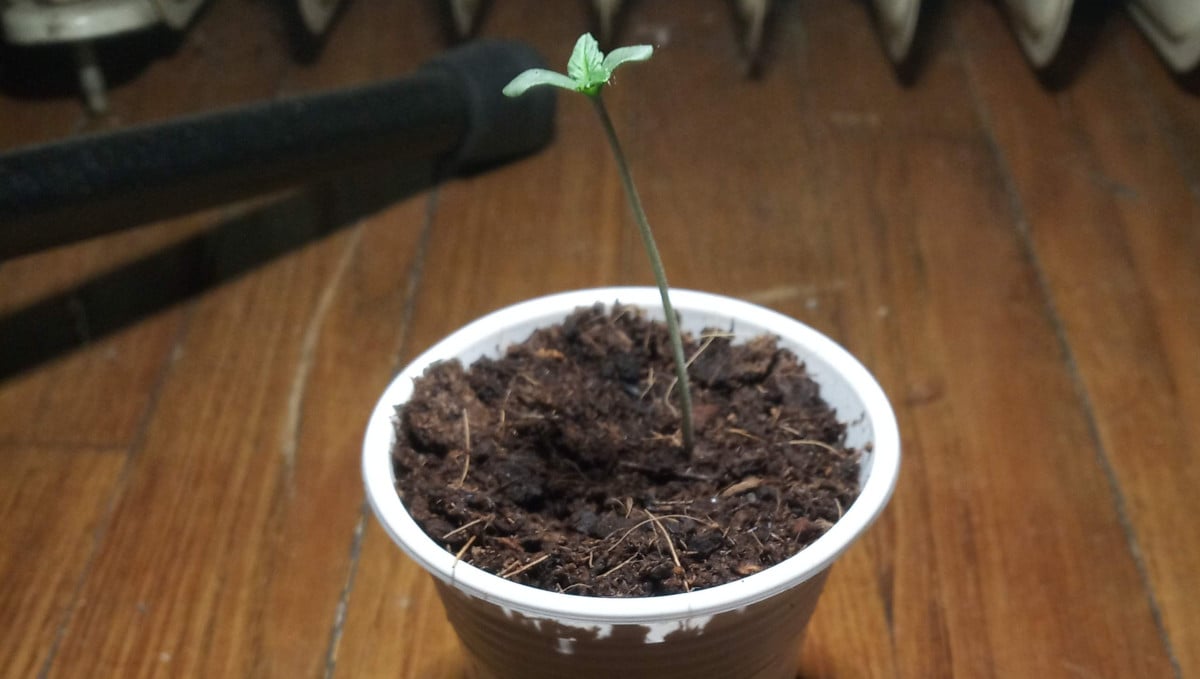
D: Stuck Shell Can be a Huge Impediment
The start was hassle-free. A single Gelato Auto seed popped out of the jiffy plug in less than 48 hours.
However, it took the grower 4 days to finally remove the ‘helmet head’ (shell). As a result, the development of cotyledons was delayed, and this was probably the reason why Gelato Auto failed to keep up with her neighbors in the first few weeks.
We recommend always taking measures to help a seed shed the outer shell as soon as possible. If you plant the bean a half-inch deep (and the medium is moist), it’ll probably lose the shell on its own while sprouting. If this doesn't happen, spray some water on the shell and in a few minutes, when it is nice and wet, gently remove it with your fingers.
Anyway, when the seed sprouted, the grower put the jiffy plug it was sitting in into a textile bag filled with 5 gallons (19 liters) of a soil/perlite mix. The plant would spend all her 14 weeks from seed to harvest in this final home of hers.
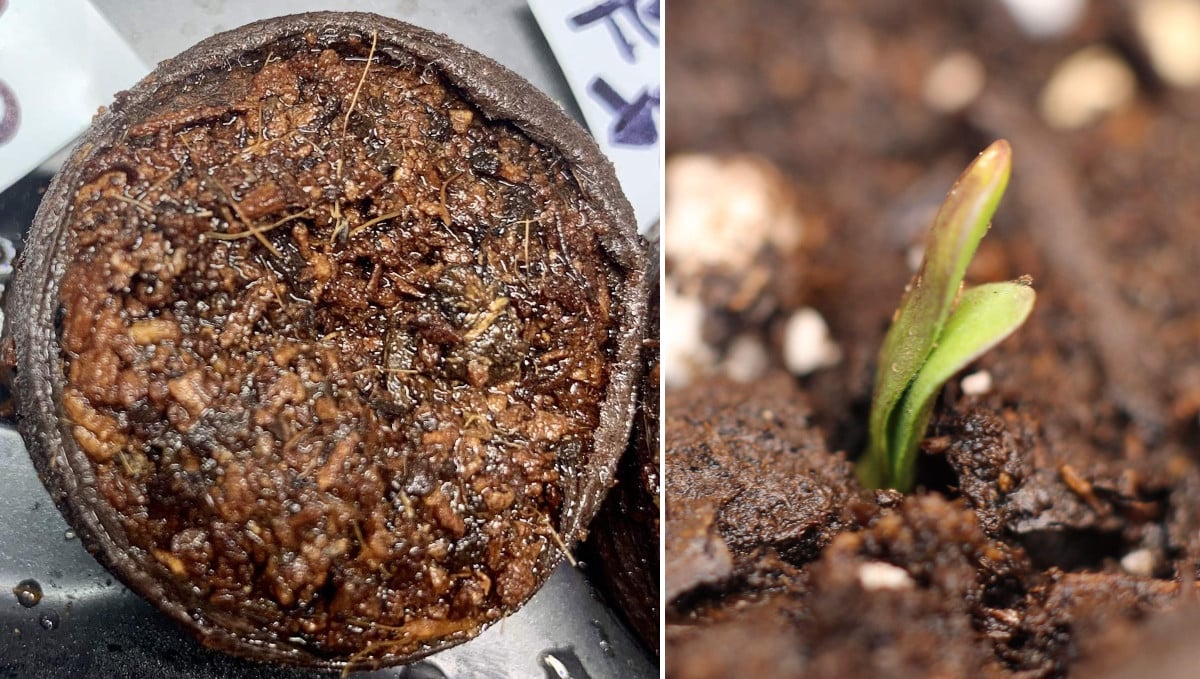
4. Early Veg | Week 2
At this point in the timeline, an autoflower usually has a good-sized root ball and needs her first feeding for the pending explosion of vegetative growth. This is also a good time to transplant or begin the HST (high-stress training). Procedures like this are better carried out halfway through the first month—before cannabis switches to flowering.
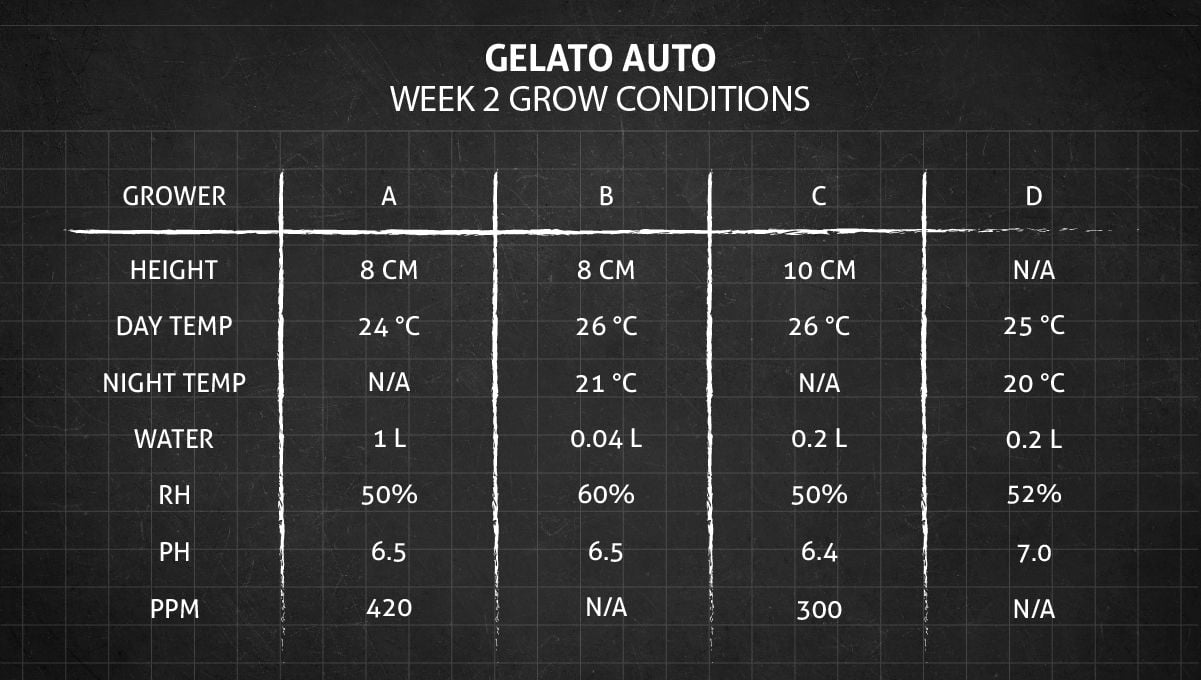
A: The Beginning of an Exciting Life
As you may remember, this particular Gelato Auto was to be fed the same one-component formula (Mega Crop) from seed to harvest. However, the gardener was determined to offset this boring routine with ceaseless training.
He topped her for the first time on day 11, just above the second node. The topping was to redirect the energy to two sets of side branches. The result? She now had 4 equal size tops instead of just one.
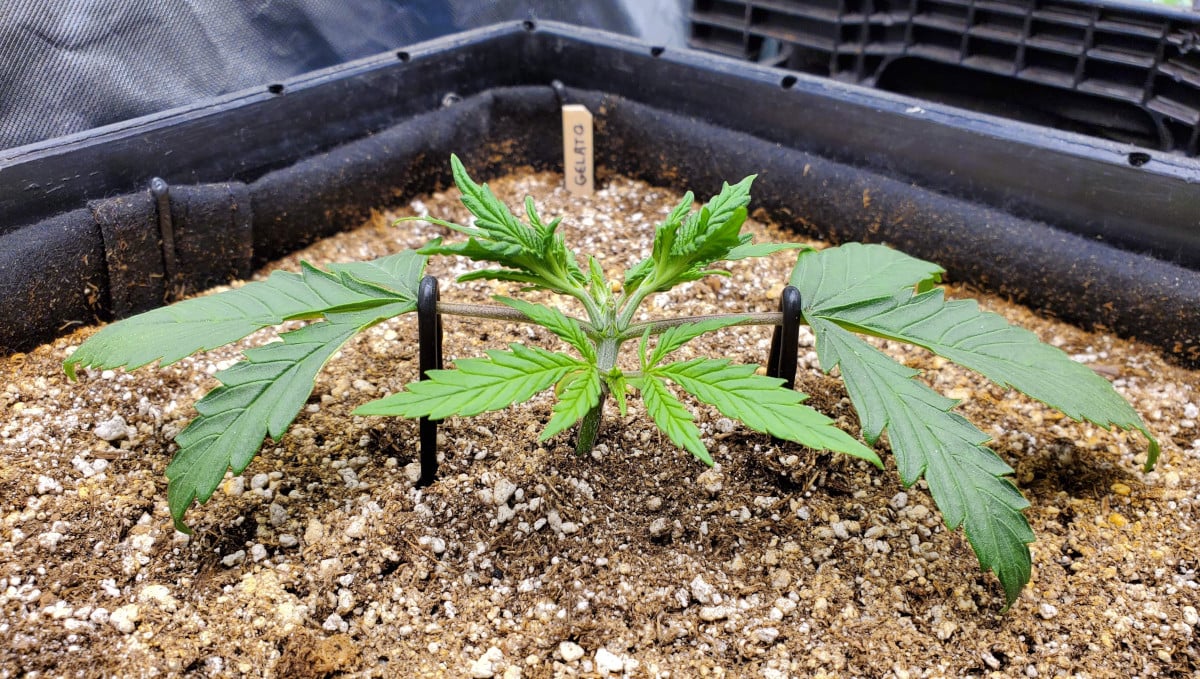
B: Extremely Infrequent Watering
There’s not much you can do with a seedling standing in a solo cup filled with soil. It only needs water when the cup feels light. And the grower took this strategy to the extreme because—throughout his Gelato Auto life cycle—he was fertigating her only when the soil COMPLETELY dried out.
Infrequent watering is a safe strategy and strongly recommended for novice growers. However, the old rule of risk and reward probably applies here, too. If you water more often, you run the risk of overwatering (which can lead to a whole host of problems). At the same time, more frequent watering—if done right—can increase the growth rate of your cannabis. So watch, learn, and experiment until you hit the sweet spot.
Toward the close of the second week, the grower introduced two components (Grow Big and Big Bloom) of the organic ‘FoxFarm trio’ that would be the staple of the diet for this cycle. Let’s take a quick overview of all three:
- Grow Big, contains large amounts of all three macronutrients (N-P-K) with slightly higher nitrogen (N) than phosphorus (P) and potassium (K), promotes healthy vegetative growth, and creates a solid foundation for the future flowering stage,
- Big Bloom, there’s no N in this formula, but a lot of P and also some K to stimulate the production of big, solid buds,
- Tiger Bloom, another flowering fertilizer with a high concentration of phosphorus and just the right amount of nitrogen plus some trace elements.
These three would be used—at different doses and according to the manufacturer’s chart—both in veg and in the different stages of flowering.
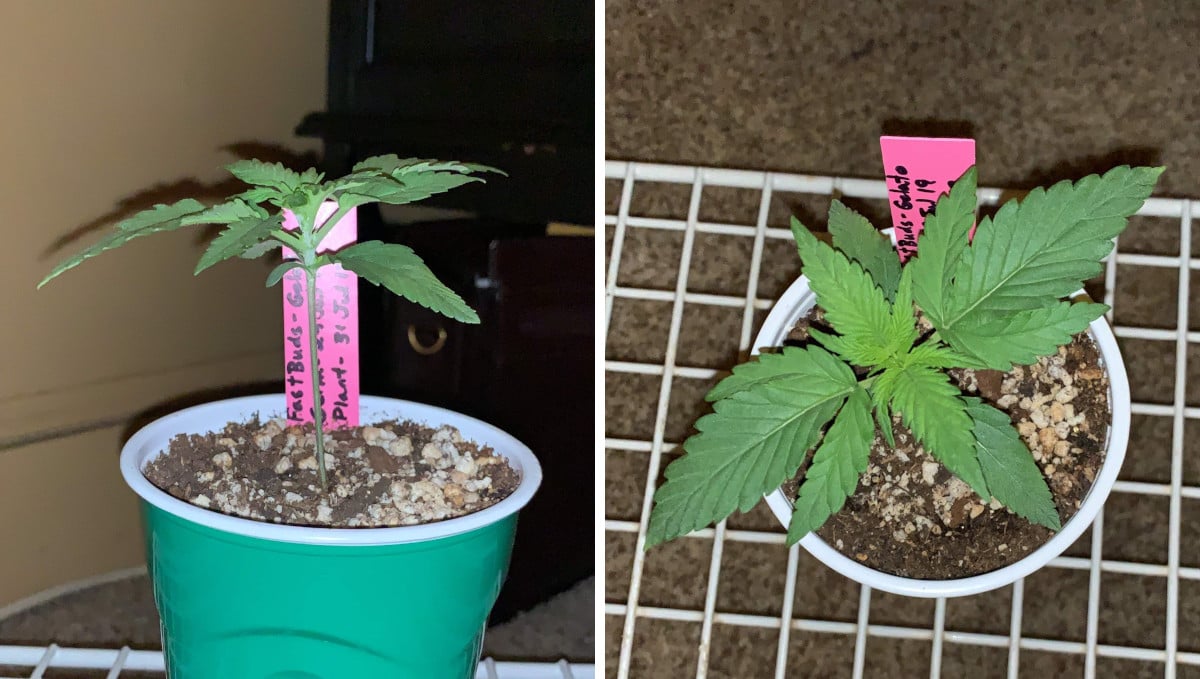
Another concern of the grower was to make this Gelato Auto taller, so that she could be trained more easily. He even turned off one LED to make the seedling stretch a bit more.
C: A Straight Road to Success
In the second week, this Gelato Auto was transplanted from the solo cup into the final 11L (2.91 gal) plastic pot. The grower noted that, as always with FastBuds, this plant developed faster and stronger than any strain by other breeders.
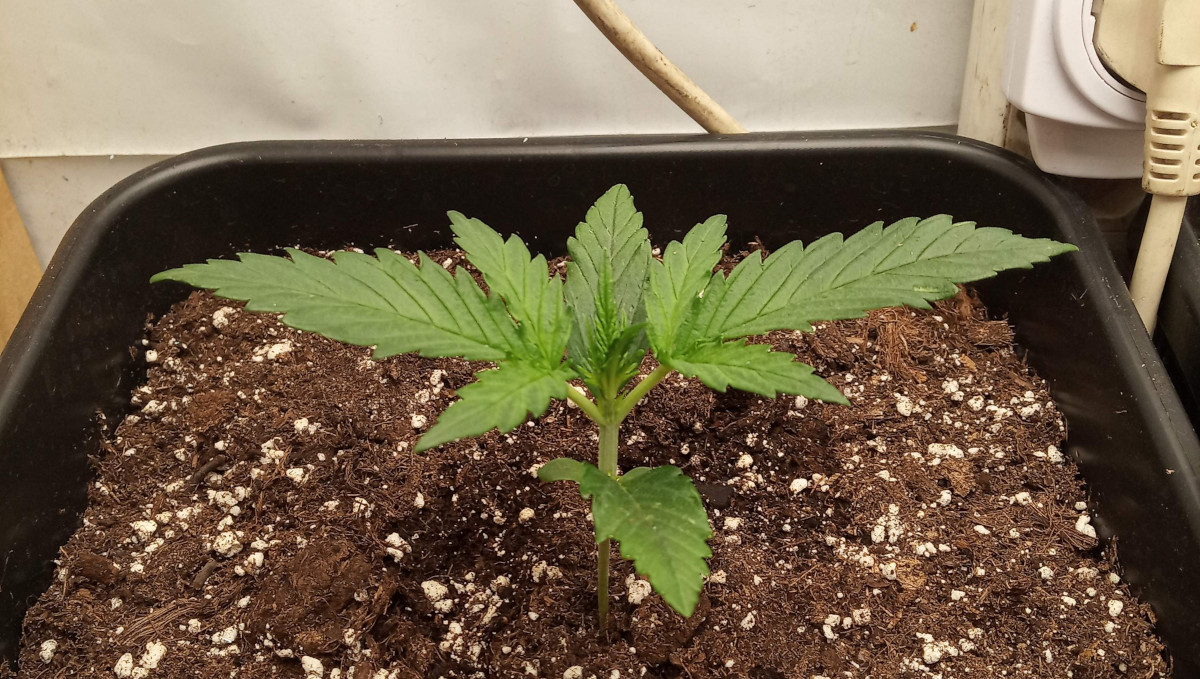
Besides the Root-Juice from the previous week, she also received her first ration of BioBizz BioGrow. Let’s take a moment now to look at the very simple feeding schedule this plant received through both the vegetative phase, the pre-flowering stage and the different stages of flowering.
- BioBizz BioGrow, full of syrupy stuff and potassium, this liquid veg nutrient is 100% organic and everything cannabis needs during the vegetative phase,
- BIOCANNA Bio Flores, perfect for cannabis flowering stages, this plant-based organic fertilizer has all the blooming nutrients in exactly right proportions,
- Atami Bloom Stimulator, not only boosts the flower production, but also affects the flavor of the final product,
- Atami Ata Bloombastic, a rich source of phosphorus and potassium, the two most important minerals for the flowering and ripening stage; also, many enzymes are added to increase stress-resistance.
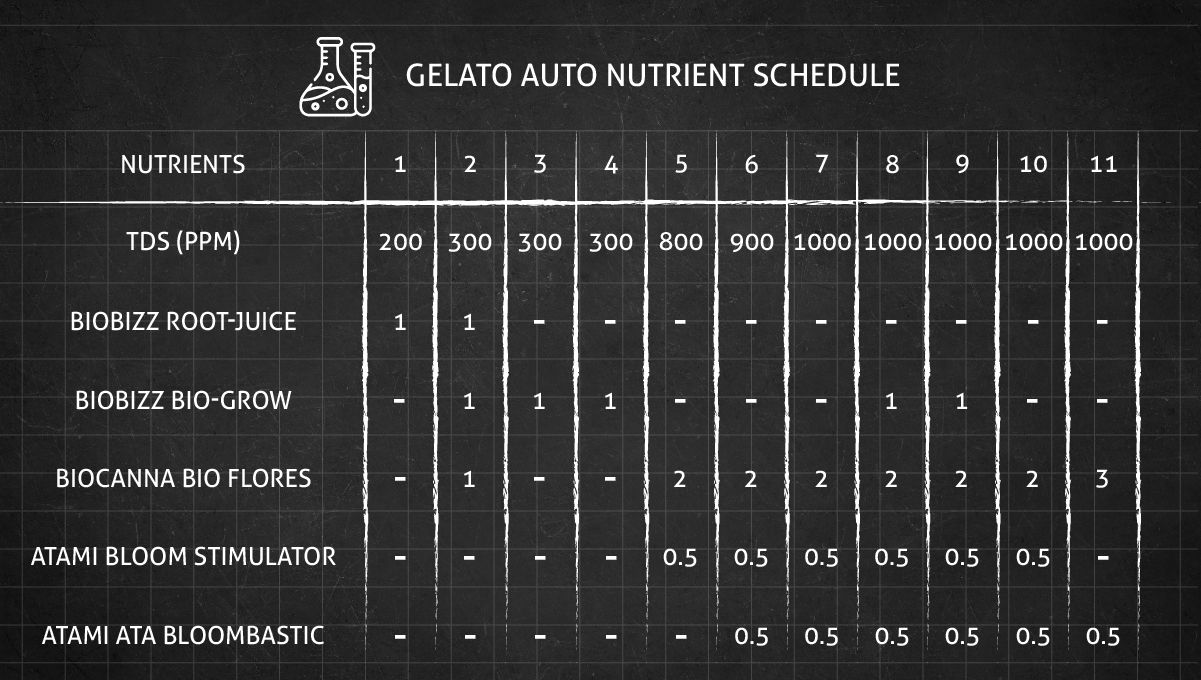
And this is it. Five organic nutrients from three different producers, but, as you shall see, you don’t have to stick to one line of products to achieve spectacular results.
D: Still as Slow as Molasses
If the first week was about waiting for the cotyledons to emerge from the shell, the second one was another nail-biting period of waiting for Gelato Auto to overcome the shock of the troubled start. The grower prefered to do nothing, to change nothing. Just wait for good genetics to do its thing. We shall eventually see it happen, but not this week.
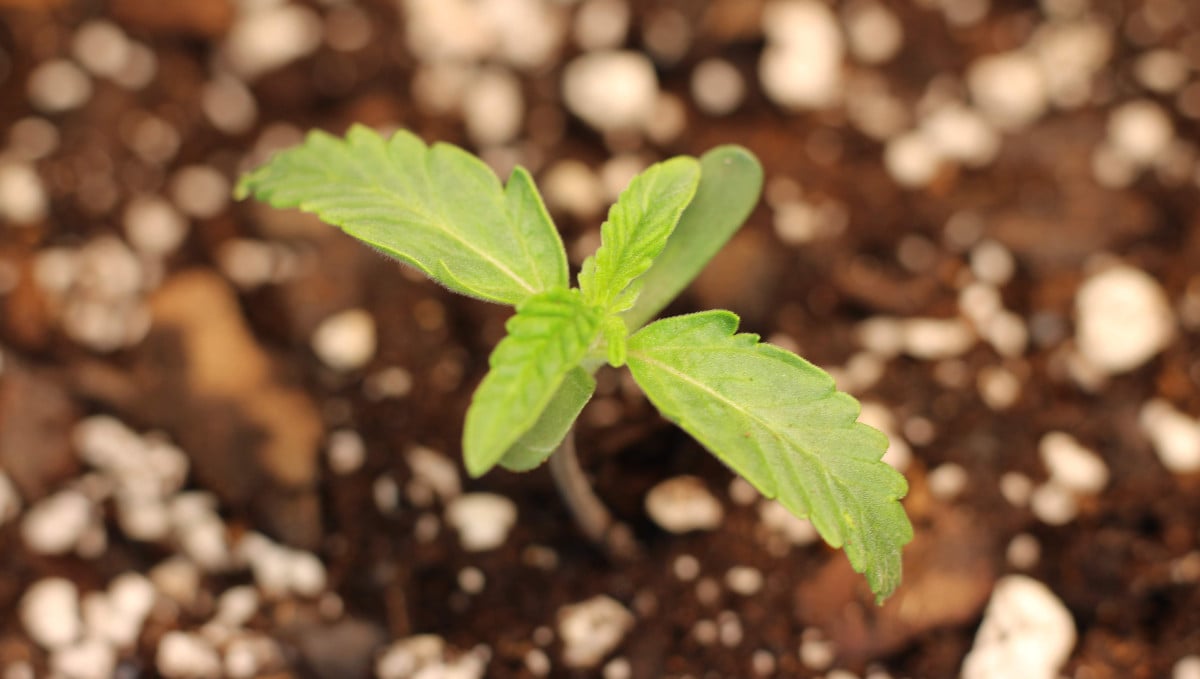
What you see in the photo above looks like a 7- or 8-day seedling, but this Gelato Auto is actually a full week older than that.
5. Mid Veg | Weeks 3-4
At this point, all four plants in our review seemed at totally different grow stages. Some were big enough for the heaviest training imaginable, others not so much so, and yet others were still transitioning from the most vulnerable seedling stage.
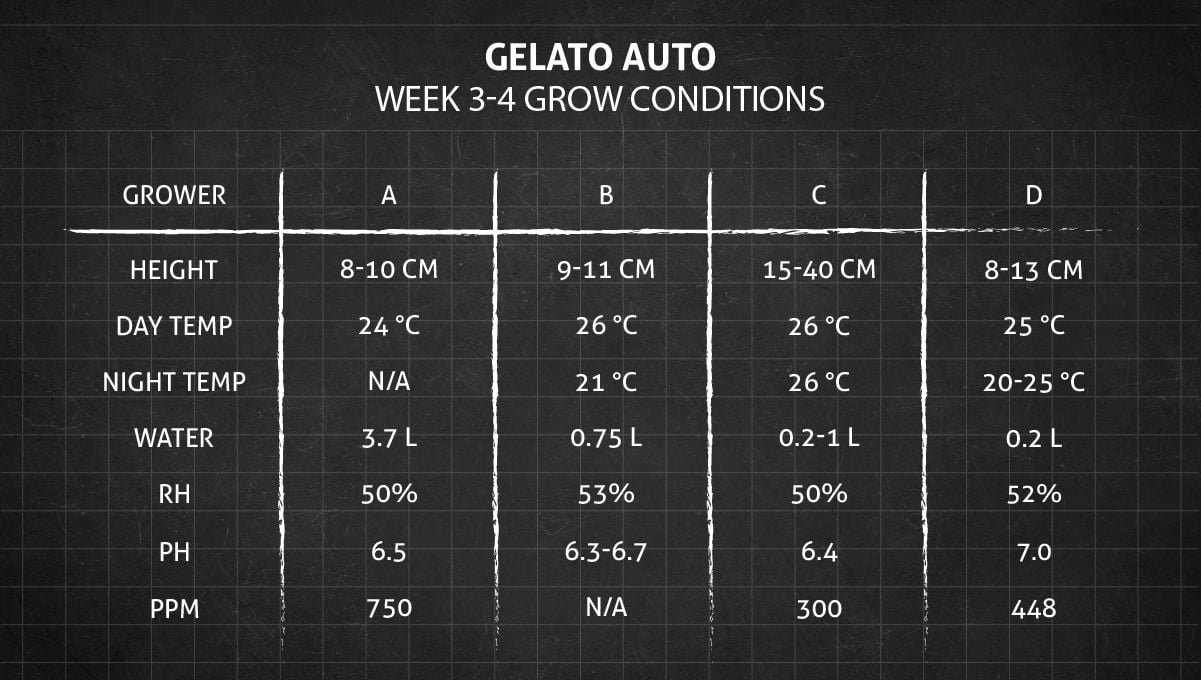
A: Face Down in the Mud
Toward the end of the third week, this Gelato Auto was topped for the third time. And by topping we mean that each of the 8 growing points on her was removed.
The idea is to make each top exactly the same size and with exactly the same potential. So that, instead of one huge central cola, a few secondary flower clusters, and a lot of larf, you get a decent number of buds that are very similar in size and texture.
This method is known as mainlining. Another and more descriptive term is manifolding. The gardener was constructing this manifold very close to the ground. To achieve this, he held down the branches and even the individual fan leaves with thick and rigid wires.
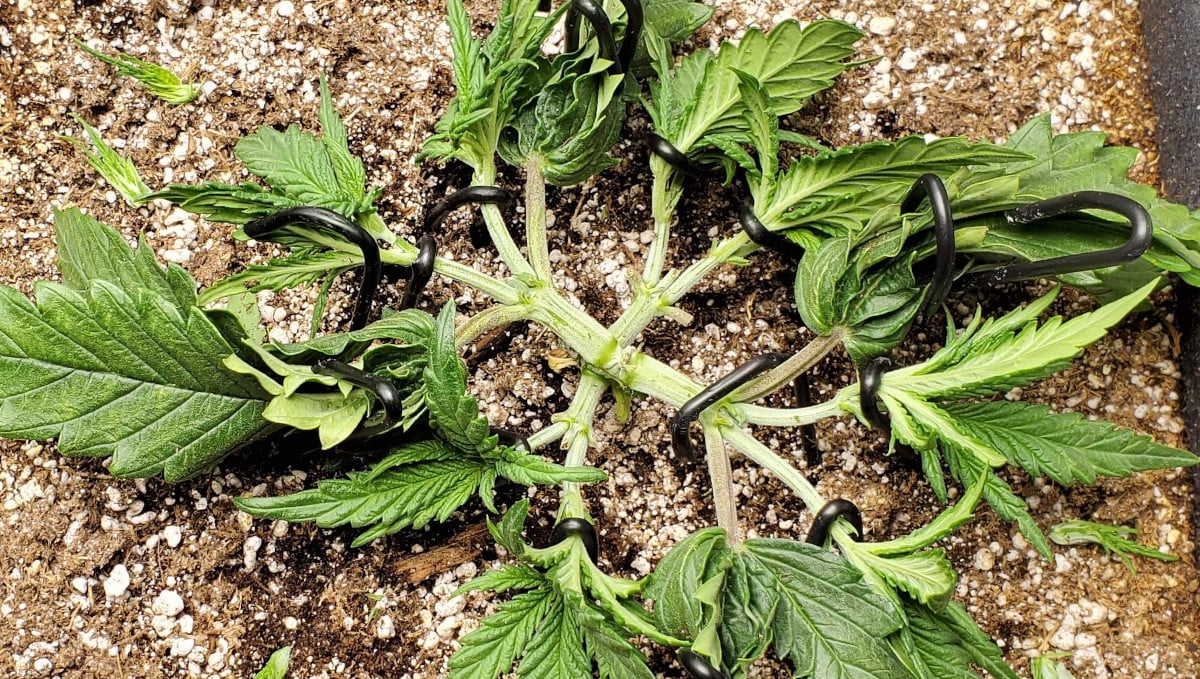
The plant kept receiving the bulk of her nutrients in the form of Mega Crop, but was also fed occasionally with this or that Greenleaf Nutrients product, including:
- Cal-Mag Pro, because both elements are very important when you grow weed in a soilless mix,
- Sea-K Kelp Extract, which is full of biologically active components for vibrant growth,
- Sweet Candy, an organics-friendly flavor & yield enhancer and a source of carbohydrates.
On day 28, the grower did something he had never done before—a 4th topping.
A word of caution: This was a very tough autoflower, and she handled all this high-stress training beautifully, without skipping a bit. Doesn’t happen with every strain (as so many other plants in the same grow bore testimony to). If you’re new to the game plus grow autoflowers, stick to LST.
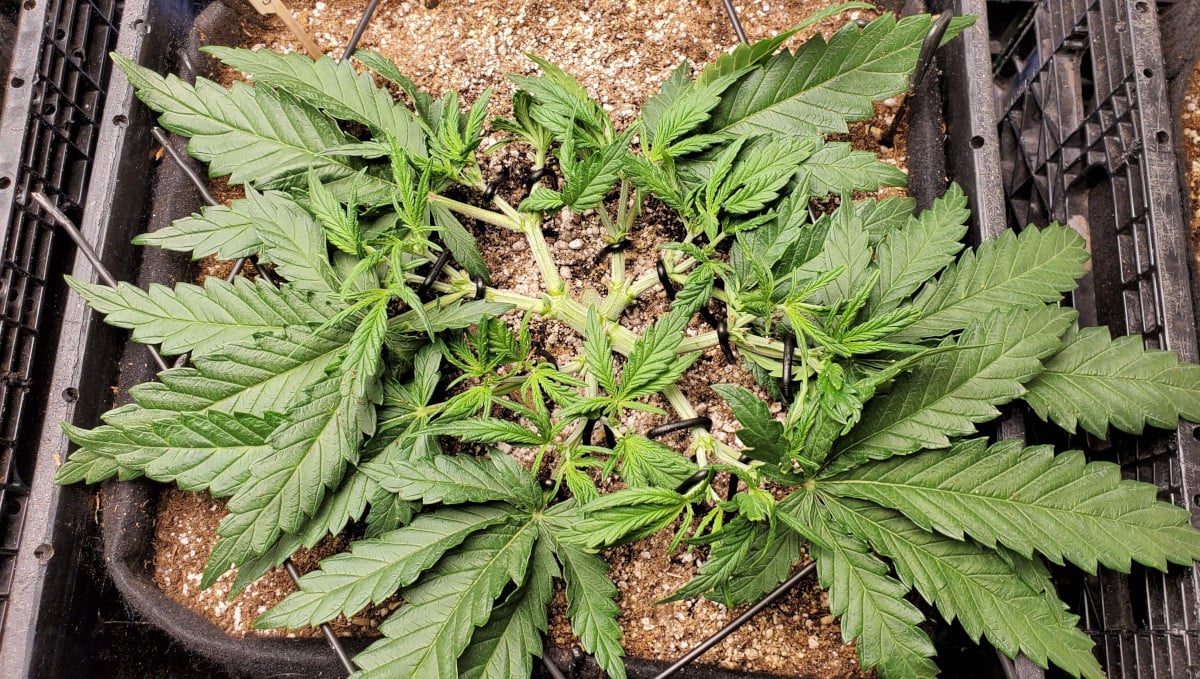
B: Topped at the Wrong Moment?
On day 18 from seed, the seedling was transplanted into a 3-gallon (11.4L) fabric pot. And on the next day, the grower decided to top her (you can see this in the picture below, on the right).
This probably was a wrong move at this moment because the plant was already showing first pistils, and once an autoflower enters into the pre-flowering stage, it’s very hard to revert her back to the vegetative phase.
Compare this to what Grower A did. He topped his girl earlier—BEFORE she had a chance to grow first hairs. The procedure probably pushed back the onset of flowering, and so did every subsequent topping. As a result, the veg continued, making the plant bigger and bigger.
Btw, the transplant itself was overdue, too, not just the topping. Cannabis flowering stages are NOT the time when the root system develops, so the repotting should be done before that.
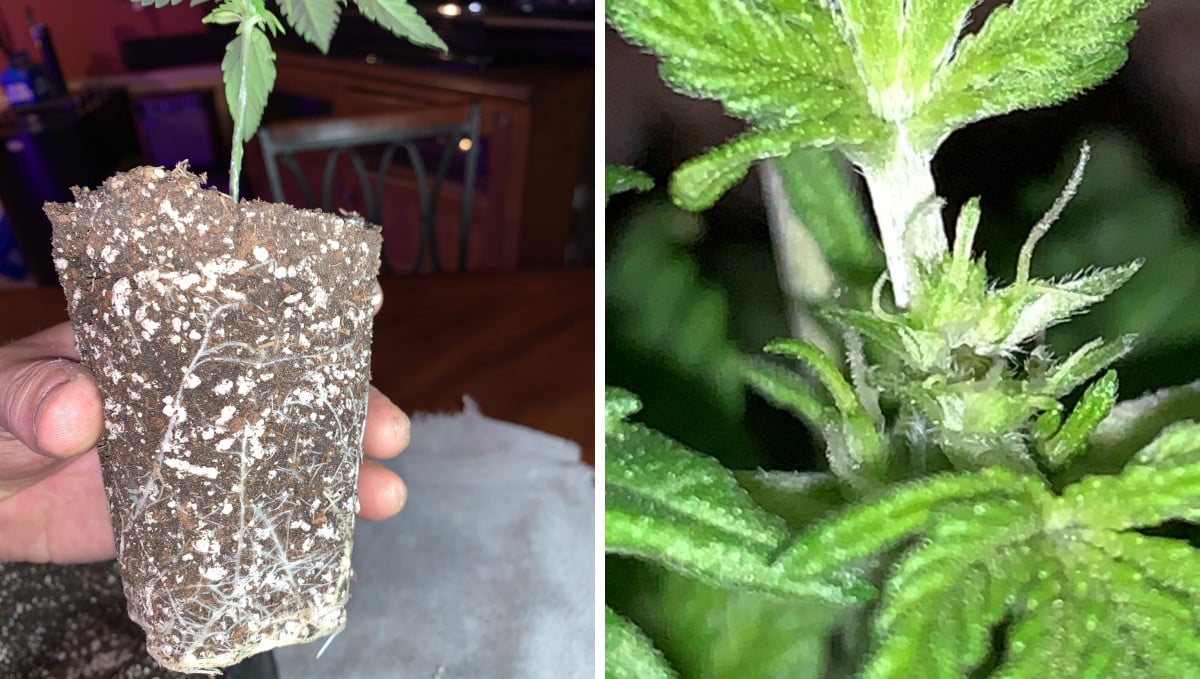
Anyway, this small but feisty Gelato Auto reacted well to both high-stress procedures done one after another.
In week 4, she received her first LST: just the tried and true tie down method and some tucking of bigger fan leaves. The grower obviously disliked defoliation, at least before the ‘home stretch’—when even the most traditional gardeners remove some foliage to give lower buds more air and light. Instead, he kept fan leaves on the branches but put them out of the way.
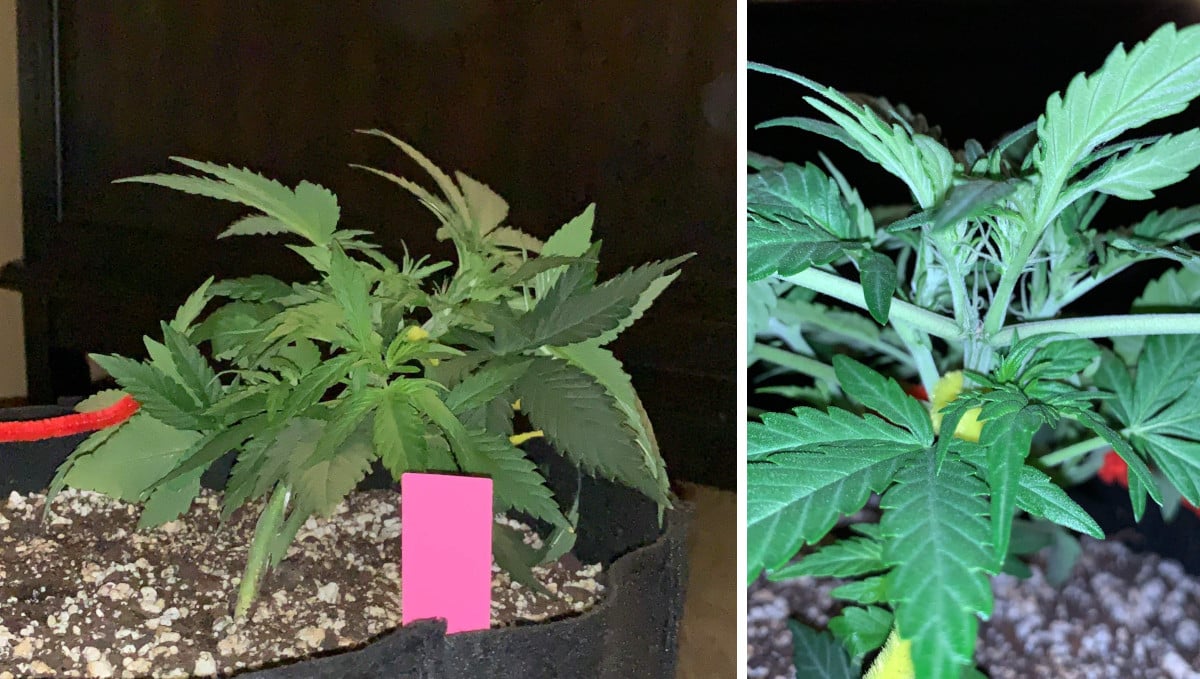
The gardener kept alternating nutrient solution with pH’d water (sometimes supplemented with Ca-Mag Plus), and when he noticed a lighter shade of green on lower leaves, he boosted nitrogen a bit, and the issue seemed to get better.
It was also so hot and humid at this particular time that a couple of fungus gnats appeared and got promptly squished. Cannabis pests LOVE hot and humid conditions which is another reason to pay attention to environmental control in indoor setups.
C: When the Growth is Really Explosive
In the beginning of the third week, the grower fertigated to runoff for the first time and had a chance to measure it. The runoff was too high at 1600 ppm. After just Root-Juice and Bio-Grow, this couldn’t be from overfeeding, so it must have been Light-Mix that wasn’t so ‘light’ after all.
So, week 3 was only plain water, and, by the start of week 4, the runoff dropped to the acceptable 900 ppm. Over the next few days, Gelato Auto exploded as you can see in the picture below.
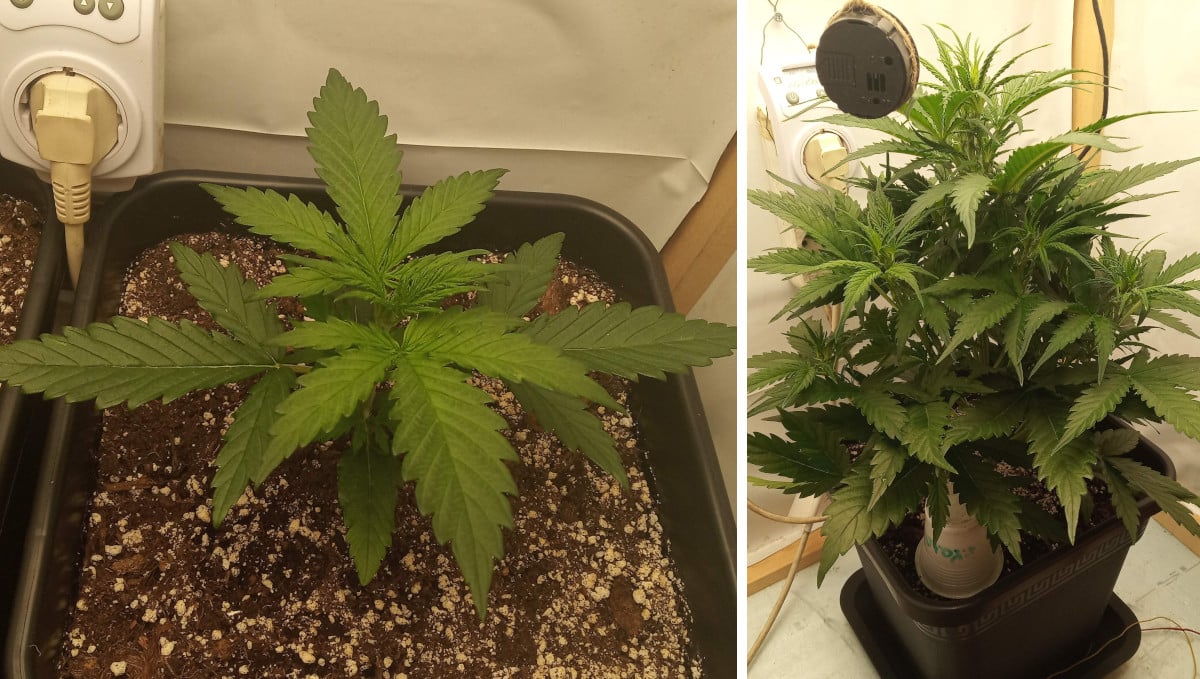
D: Never Give Up on a Runt?
The third week was the last one when the grower had to worry about his Gelato Auto progress. By the end of it, she finally picked up pace, and the growth became unstoppable for the remainder of the timeline.
Since the development had been slow and the grow bag filled with a lot of nutrient-rich medium, he gave this anorexic lady her first feeding only in the fourth week.
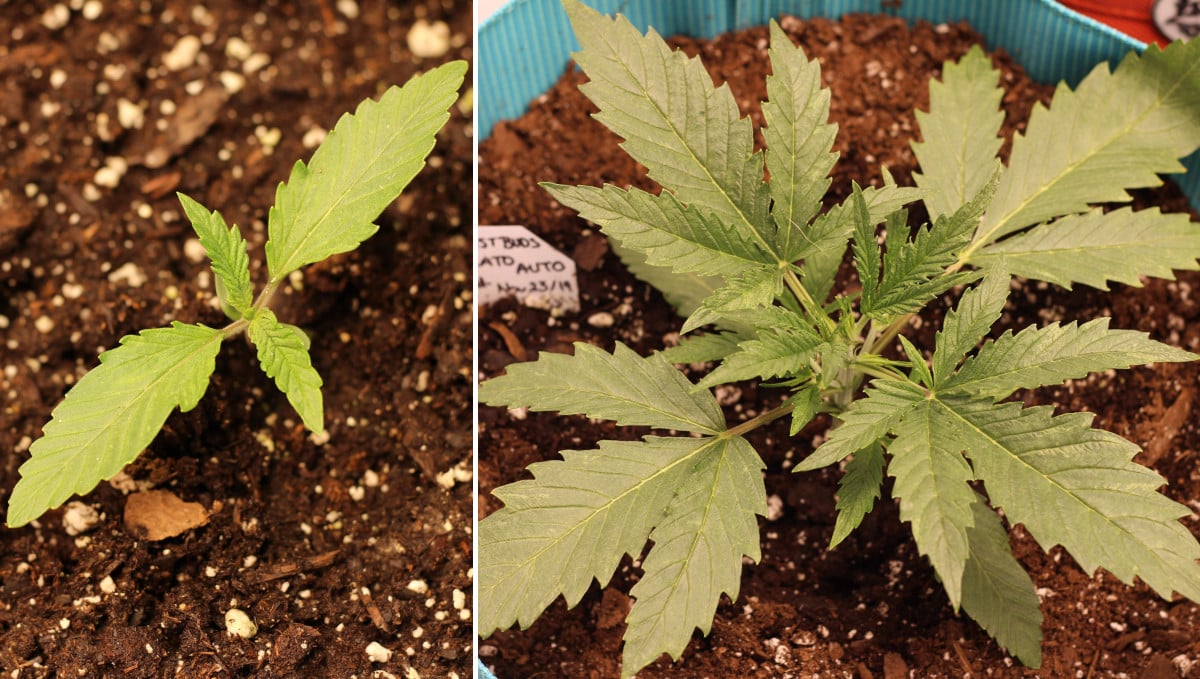
The growth was explosive.
6. Transition (Pre-Flower) | Week 5
The onset of cannabis flowering stages obviously depends on how healthy and vigorous a plant is and whether it has received any high stress training or not. Hence the difference in the four Gelato autoflowers as they begin their second month.
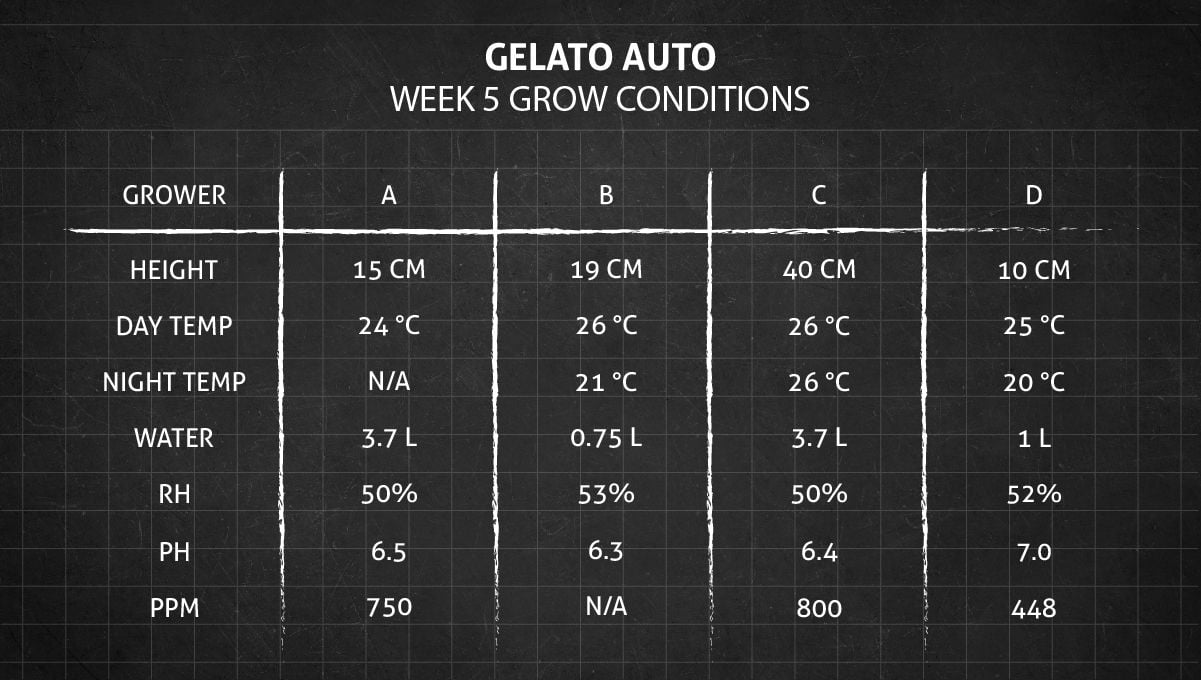
A: Is it Weed or a Sundial?
In week 5, this beast of a plant was still in veg. Probably because she had been HSTd so much. Or maybe because she was a very vigorous and large cultivar to begin with.
She was still receiving her Mega Crop diet and drank more than a gallon of water every 4 days. Her topping days were, thankfully, over, but the grower did defoliate her heavily—you can see the result in the picture below.
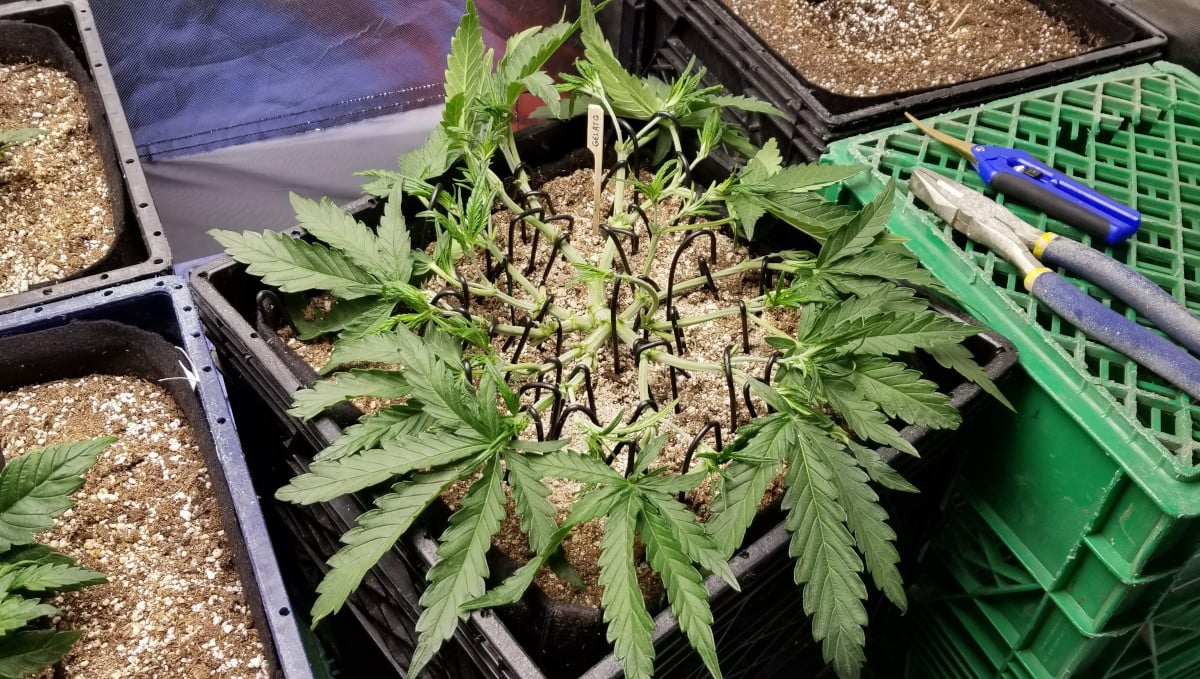
By the end of the week, a few pistils were visible in the nodes, meaning that this girl was ready to transition to flowering.
B: Still a Bit Lopsided But Starting to Fill Out
For Grower B, there weren't enough pistils in week 5 to mark this as the start of flowering time, so he was still feeding his Gelato Auto veg nutrients. He noticed how after a generous fertigation (to runoff) all the leaves perked up and were stretching for the light. This made him think he’d been underwatering the plant before.
He spent this week tying down the side branches that were blocking the light. The shape was not exactly how he’d like it but getting there.
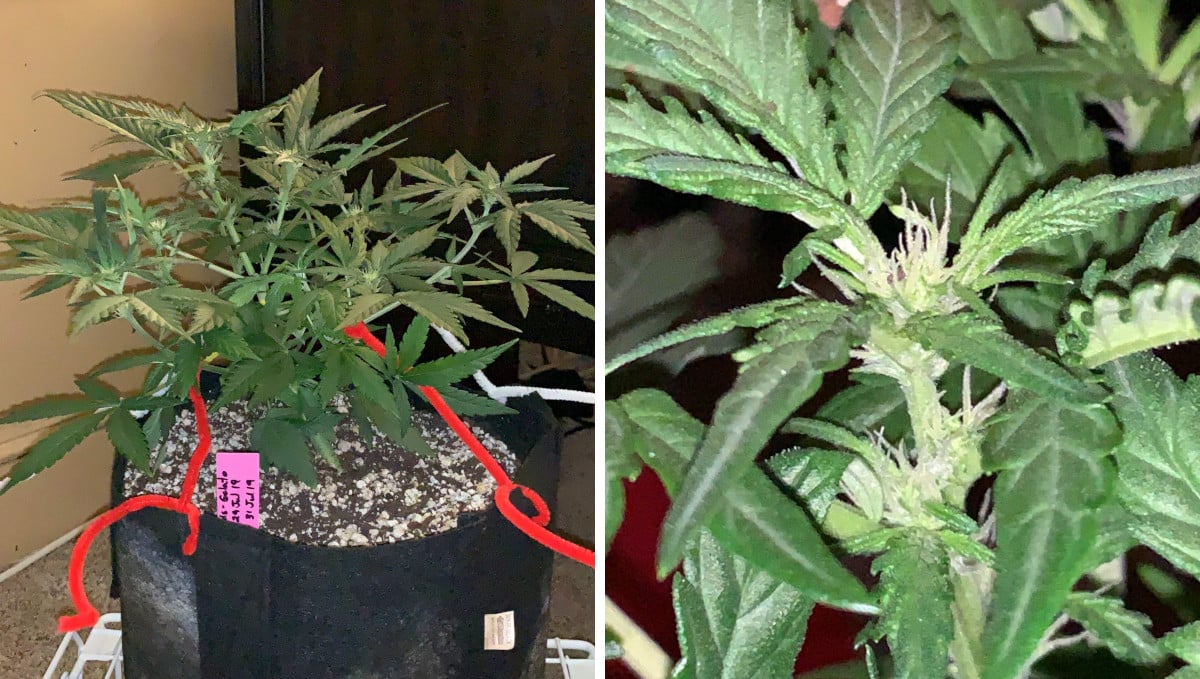
C: Some Tentative LST
This Gelato Auto had transitioned to flowering the previous week. At least, it was then that first pistils appeared. Now, in week 5, she was flowering for real. The grower decided to train his autoflowers a bit. Basically, it was just tying down the main stalk. With two autos in a tiny space, there simply was no room for anything more radical.
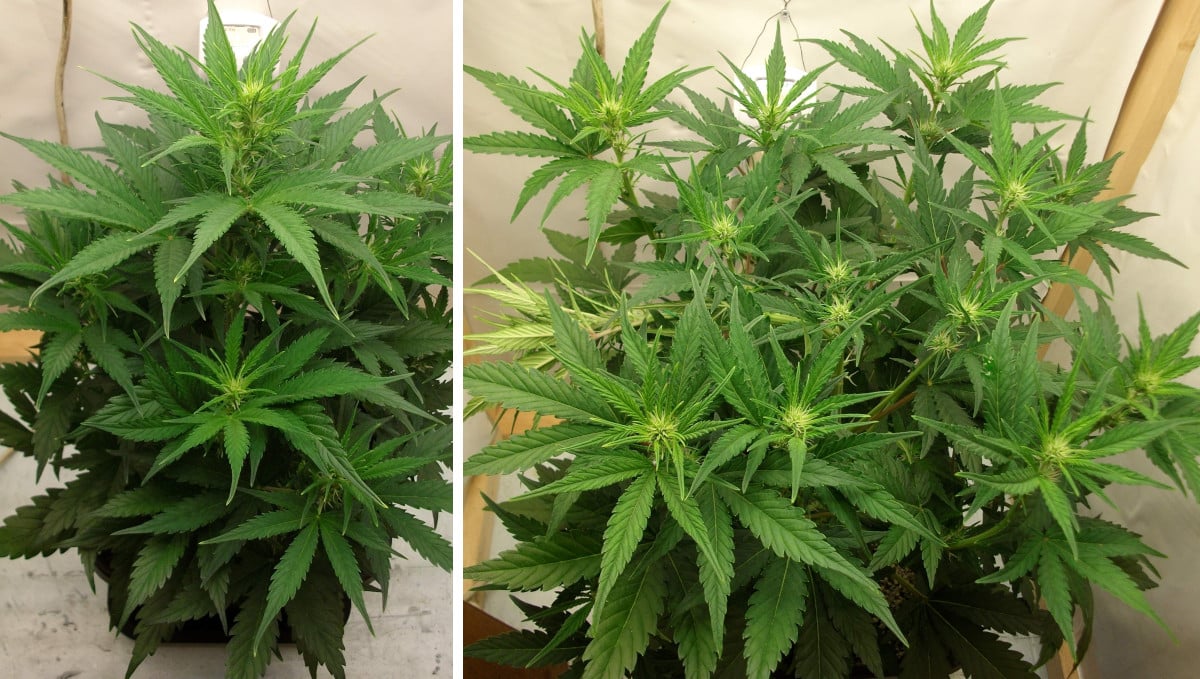
D: A Comeback (With a Vengeance)
The exponential vegetative growth continued in week 5. The plant got large enough for LST and even defoliation. And every time she was pushed down, she came back up in no time and required another bout of LST. However, the start of flowering was nowhere in sight just yet.
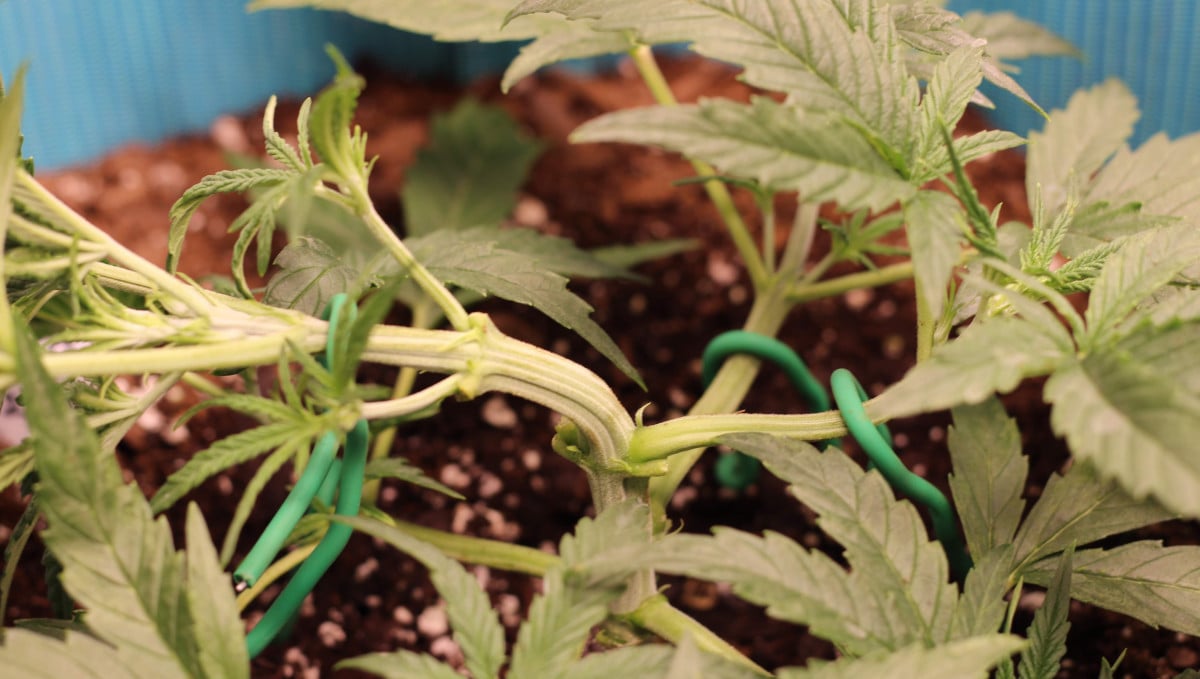
7. Early Flower | Weeks 6-7
In the present review, Gelato Autoflower flowering stages all came at different points in the timeline. And we see a consistent pattern here: plants that grew naturally were quicker to enter the flowering stage, those that were either HSTd early or stressed unintentionally were vegging for longer.
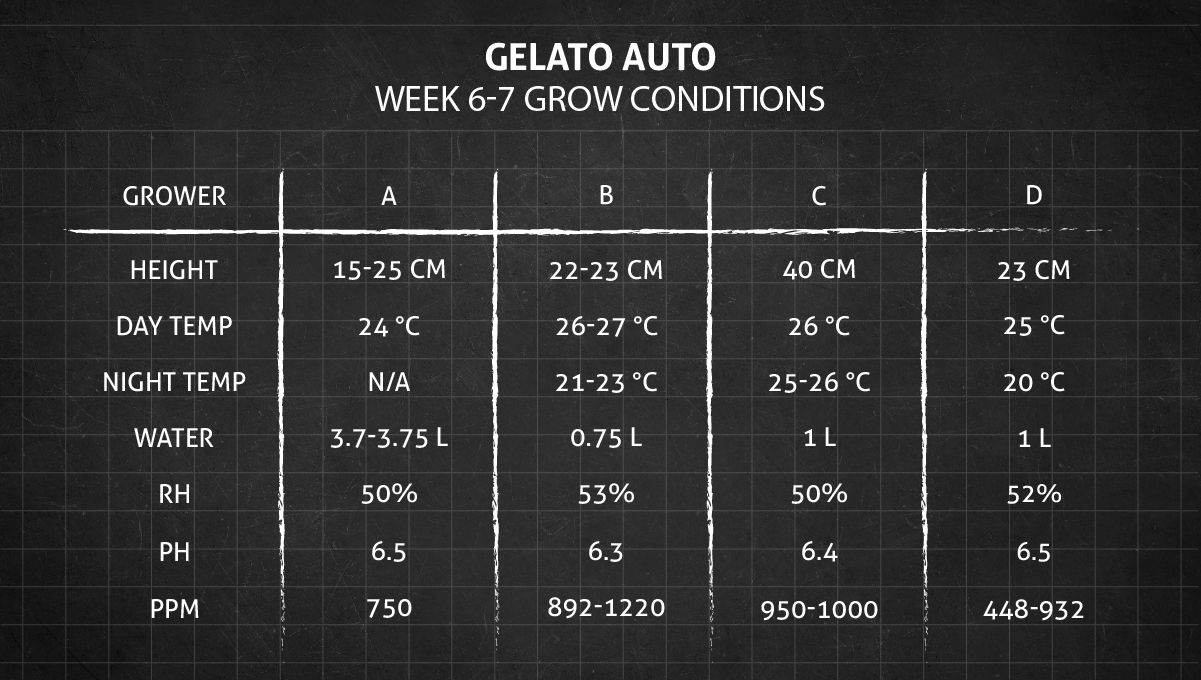
A: The OCD-Style Training Continues
The grower continued working on his Gelato Auto every day: cutting off the leaves or tucking them under, spreading the branches and adjusting the ties, etc. He was happy that he had managed to make the 4th topping—the one that resulted in 32 branches—just before the flip to flowering.
The overall number of branches seemed a bit too much, but he decided that he would simply prune some of them if needed.
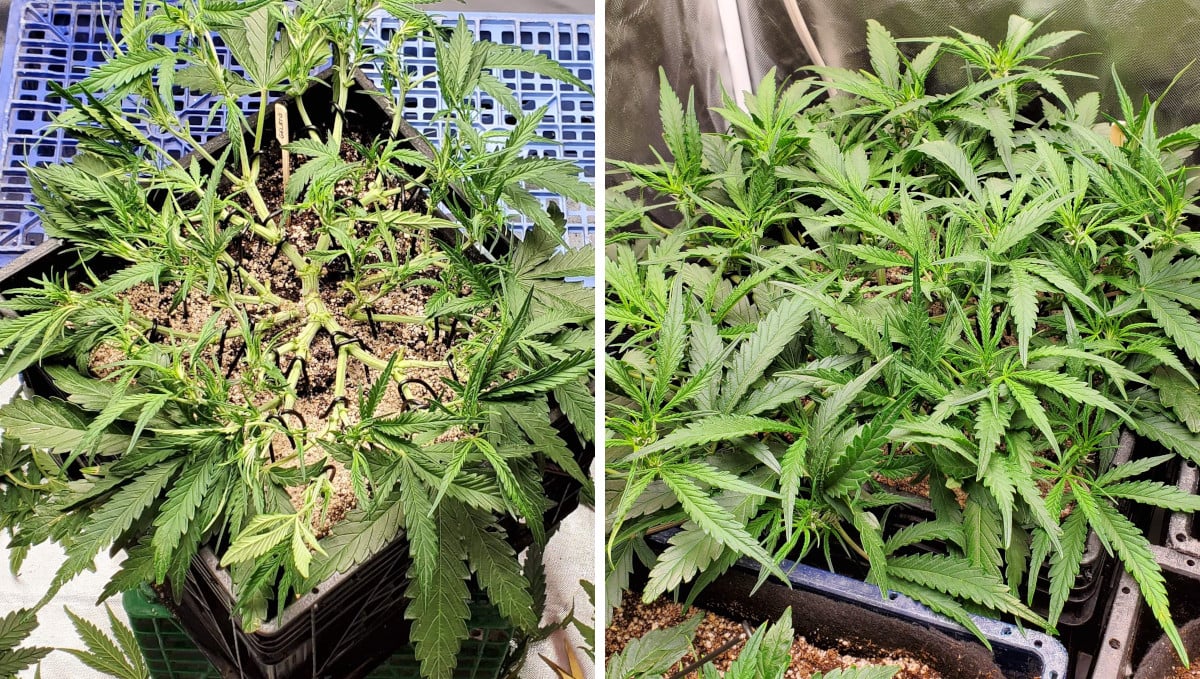
The girl showed enough vigor to bounce back right away after every heavy defoliation.
Now she received 2 gallons with every watering, with a 20% runoff. This was meant to avoid any nutrient build up. Since the guy handled the pots every day—with all the work he was doing on his girls—he knew exactly how much the pots weighed and, when they felt light, he watered them. At this point, Gelato Auto got her drink and food once every four days.
In addition to MegaCrop, Sea-K, and Sweet Candy, she now also received:
- General Hydroponics Calimagic, contains a readily available form of calcium and magnesium to prevent a deficiency of these two secondary nutrients,
- Green Planet Nutrients Rezin, a source of molybdenum (Mo) and vitamin B1 which increases the essential oil and resin production.
The total concentration of the nutrient solution was 790 ppm.
And in the picture below, you can see how far the gardener had gone with the final defoliation of his Gelato Auto which was already stacking up flowers at a rapid pace at this time.
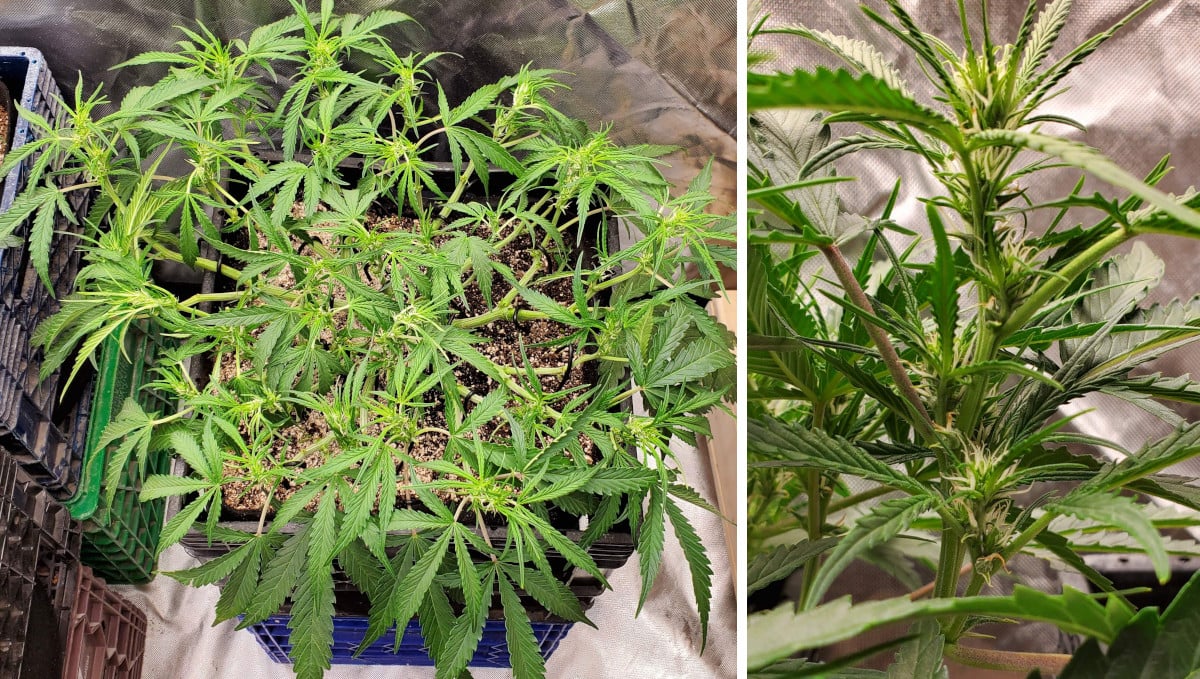
B: More Symmetrical Now
In the 6th and 7th week, the grower continued with a very mild training, tucking a few leaves here and there and spreading and tying down branches. Now the plant had begun to shape up.
He was regularly measuring the runoff and at some point noticed how the pH of it began to creep up—all the way up to 7.1. To counteract this, he began to lower pH of the solution to lower readings of 6.2-6.3.
He also noticed some clawing of the leaves and raised the light a bit in case that was the reason. But we think it was probably a mild case of nitrogen toxicity—because the grower switched to flower nutes a little too late.
The first sign of nitrogen toxicity is a deep dark shade of green in leaves. Then follows the clawing. Too much nitrogen in flower slows down the development of buds and hurts yields.
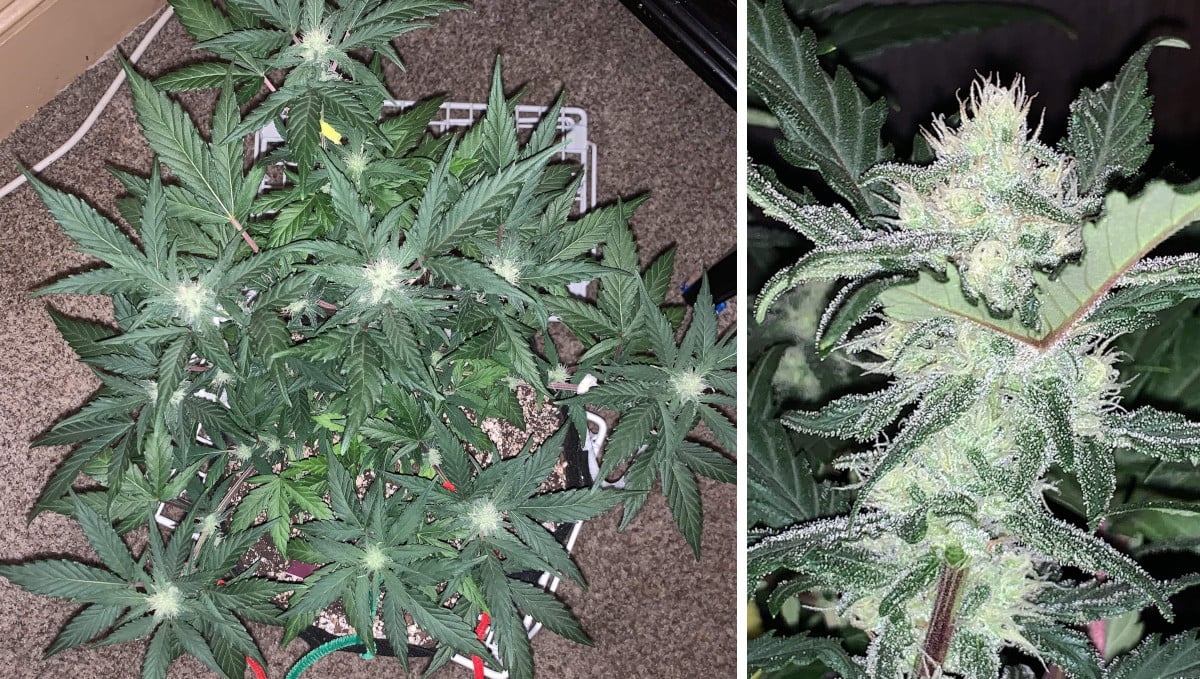
C: Hardly Trained But Very Symmetrical
This Gelato Auto had well-developed side branches, and so the simple tying down of the main stem was all she needed to become a very compact indoor plant with almost a perfectly flat canopy.
The grower described her as the smelliest plant he had ever grown, and, by weeks 6 and 7, the citrus smell became very strong. The buds also started to turn very frosty.
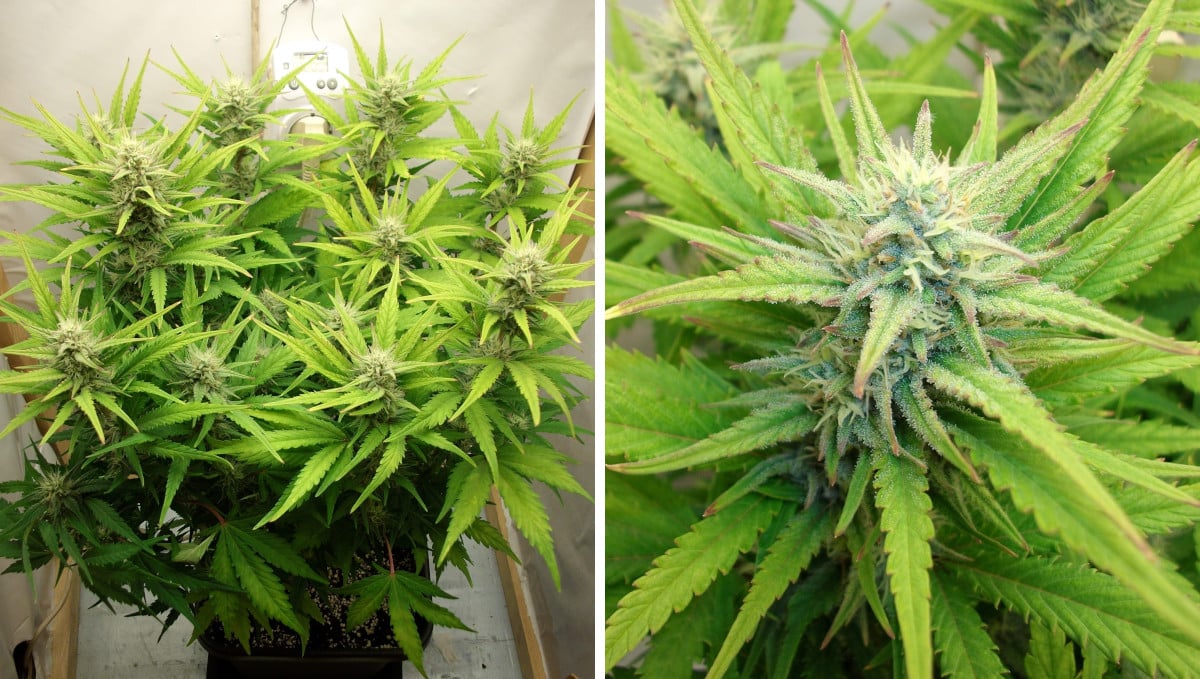
In the picture above you can also see that the foliage looked a bit hungry for nitrogen. The reason was probably the fact that, in week 3, the girl received only plain water (because of the too hot soil mix and too high runoff). When the runoff was low enough again, the flowering started, and both Gelato Auto and her neighbour were fed only blooming nutrients going forward.
That was why the grower would reintroduce veg nutes for two weeks in mid-flowering.
D: Finally About to Transition
The LST done in the fifth week and repeated several times over the course of the next two weeks made this Gelato Auto big, bushy, and dense enough to call for a rather heavy defoliation. Gone were the days when the grower was afraid to touch his girl because of how fragile she was.
By now, she had turned into a gorgeous lady. You can see in the picture below what we are talking about.
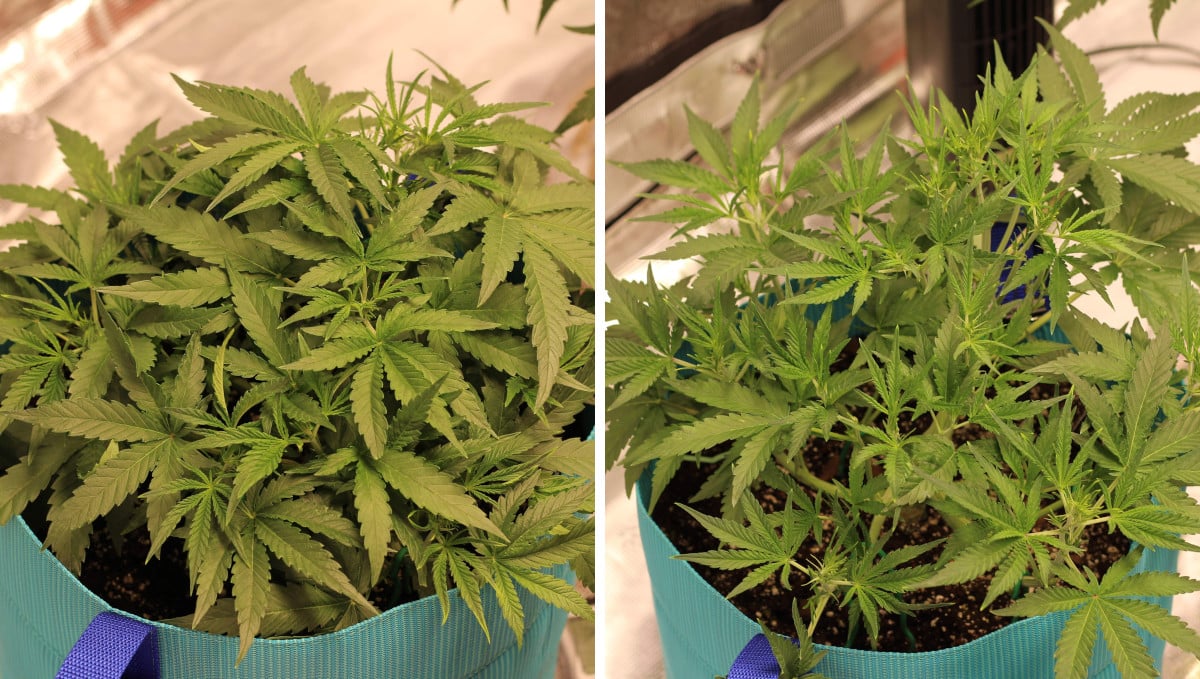
In the 6th week, the guy THOUGHT he saw the first pistils, and after a few days he confirmed it. So he marked week 7 as the beginning of flowering time. Perhaps he was wrong. Despite a lot of narrow, almost thread-like leaves on tops and a few female hairs here and there, the flowering had yet to begin.
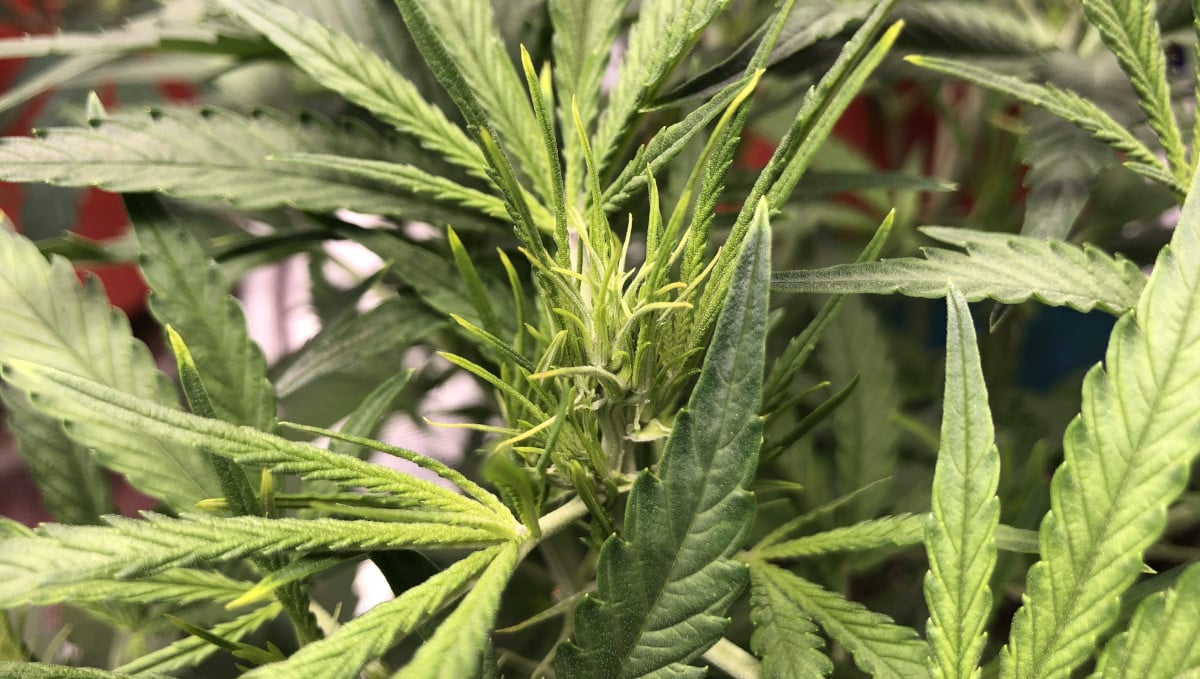
8. Mid Flower (Bulk Phase) | Weeks 8-9
By this time, two of Gelato Autos were 4 weeks into flowering and—with all those plump flowers and a thick coat of trichomes—looked almost mature. For the other two, the flowering time has also begun.
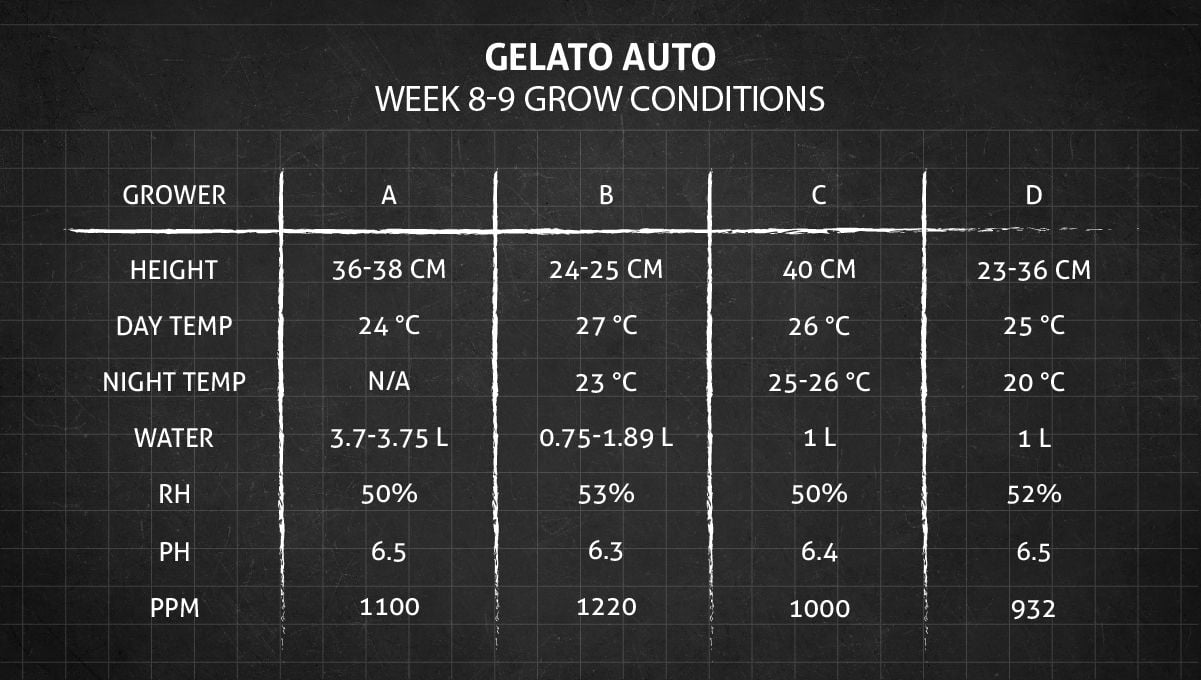
A: A One-Plant ‘Sea of Green’
In weeks 8 and 9, this Gelato Auto got so big, it was difficult to find a space in the canopy to water her. She looked a bit banged up, with so many leaves gone and the rest “ripped, beaten, torn, nute fried, wind burned, twisted 360”.
However, none of this had prevented her from doing her thing which was growing hefty flower clusters already covered with some sugar. None of the leaves showed any deficiency, and on the whole Gelato Auto looked absolutely happy.
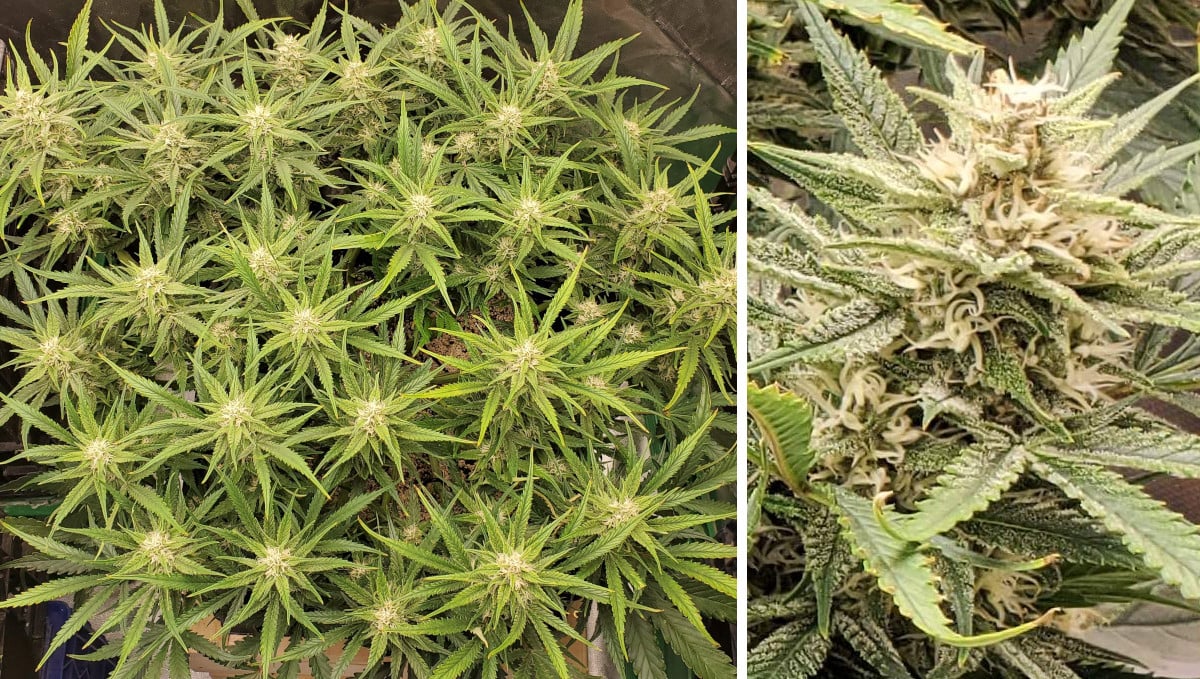
The girl also got very thirsty. She was drinking her 2 gallons in 2 days now and could probably have handled more frequent watering. The thing is that each time the PPM of the runoff was much higher than what she received, like 1100 in -> 2110 out, or 1100 in -> 1550 out.
This happens with too long periods between waterings but also signals that a plant doesn’t really need that much nutes. So, at the end of week 9, when the grower saw more tip burn, he decreased PPM of his solution to under a thousand again, 850 to be exact.
By this time, he swapped out Sweet Candy for Greenleaf Nutrients Bud Explosion. This 0-2-4 P-K booster is used in the initial weeks of flowering to increase the number of bud sites, and at later stages it makes the buds more bulky and heavy.
B: A High-Yielding Dwarf
Now, at least 4 weeks into flowering, Gelato Auto still received a copious amount of water or nute solution every 2-3 days, but she got more thirsty now. She drank about a liter a day.
The grower had waited for a stretch in vain—with all the training, this little plant remained just under 10 inches (25cm) till harvest. Nevertheless, it looked more and more like she would deliver big time, at least for such a small-statured girl.
At the very end of week 9, the grower defoliated his Gelato Auto for the first time and quite heavily, too. He wanted the plant to focus her energy on buds instead of foliage. The buds were already plump and heavy and covered with a generous amount of ‘frosting’.
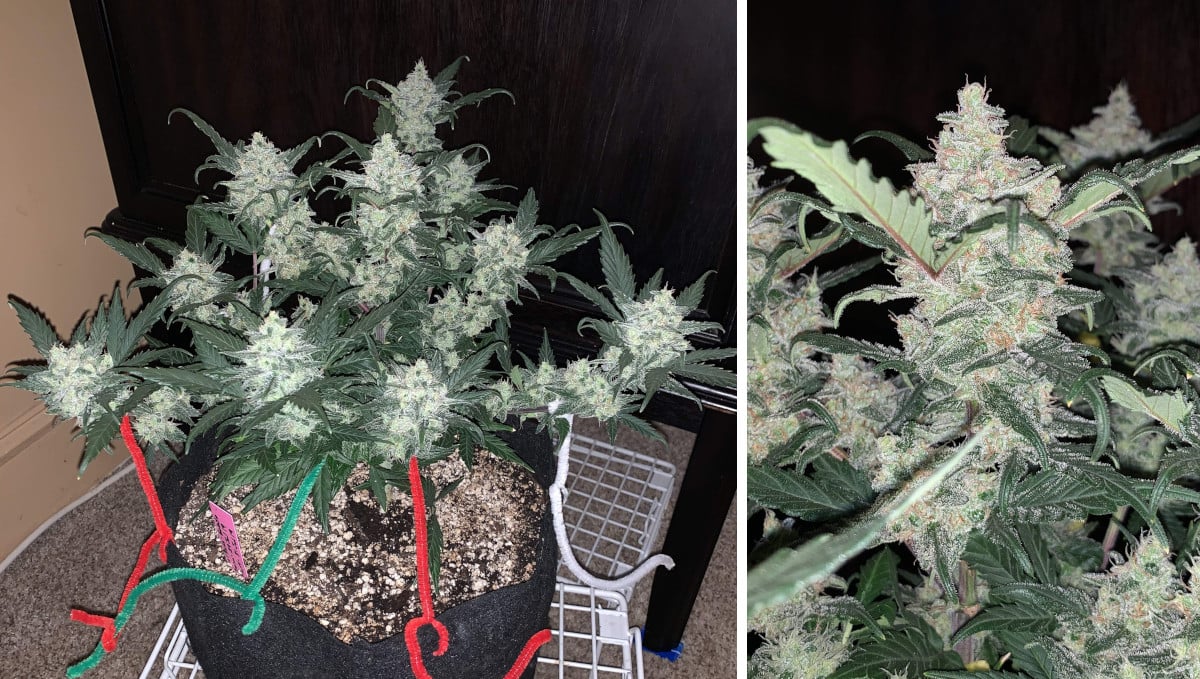
C: A Beautiful but Premature Fade
Now, 4 weeks into flowering, this Gelato Auto looked way more mature than she actually was—because of the fade. The grower even had to add Bio-Grow again to his feeding mix—to help his nitrogen-starving plant regain some vibrance.
Besides that, she developed amazingly, with buds getting bigger and denser every day and with generous amounts of delicious smelling resin.
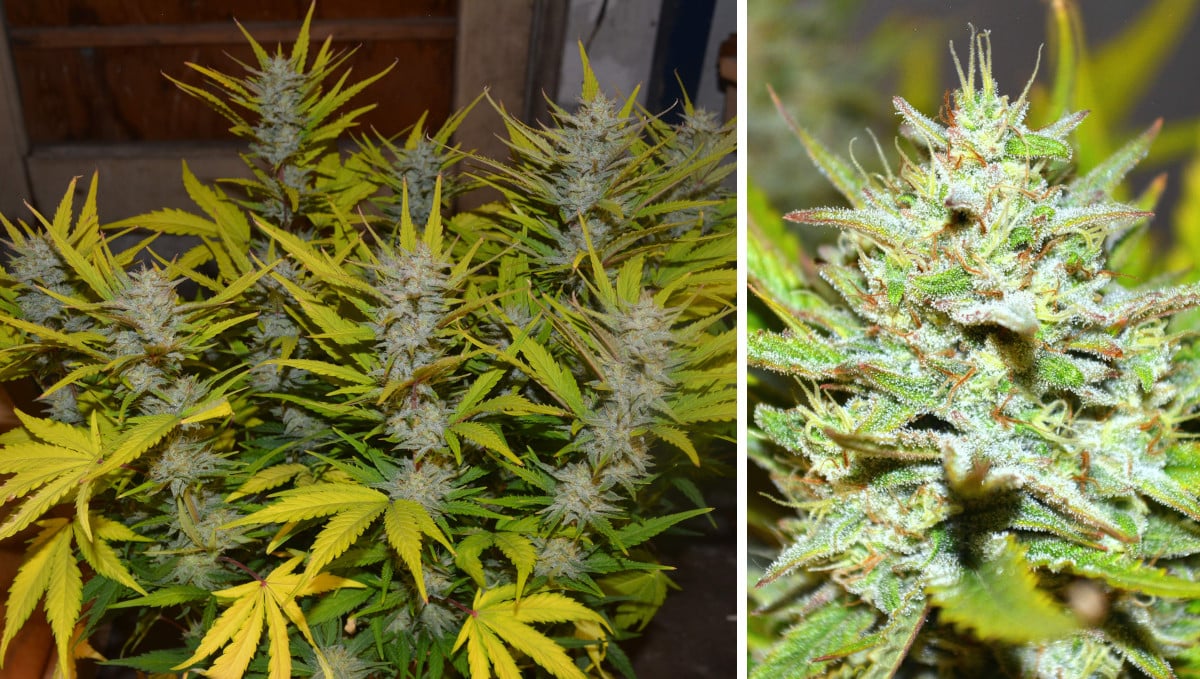
D: Flowers Everywhere
So far we haven’t mentioned the feeding that Grower D’s Gelato Auto received.
For the first three weeks she got just plain water, and in weeks 4 through 13 the grower utilized a very simple schedule, with rather low TDS readings in the start (448 ppm) which he bumped to 932 ppm and kept this level till the final flush.
The staple of this regimen was an Advanced Nutrients 3-part combo containing all three macronutrients and all the necessary trace elements. At some point, he added other Advanced Nutrients supplements that are important for the autoflower flowering stages. And here they all are:
- pH Perfect trio (Bloom, Grow & Micro), a classic N-P-K + micronutrients formula,
- Bud Candy, to boost the smell/taste and potency of your buds,
- Rhino Skin, silicon and potassium to make branches stronger and able to support the weight of the flowers,
- Bud Ignitor, makes those flowers stake up from top to bottom,
- Big Bud, pumps the buds full of extra weight and aroma,
- Overdrive, a P-K rich nutrient for a final spurt in growth before the finish line.
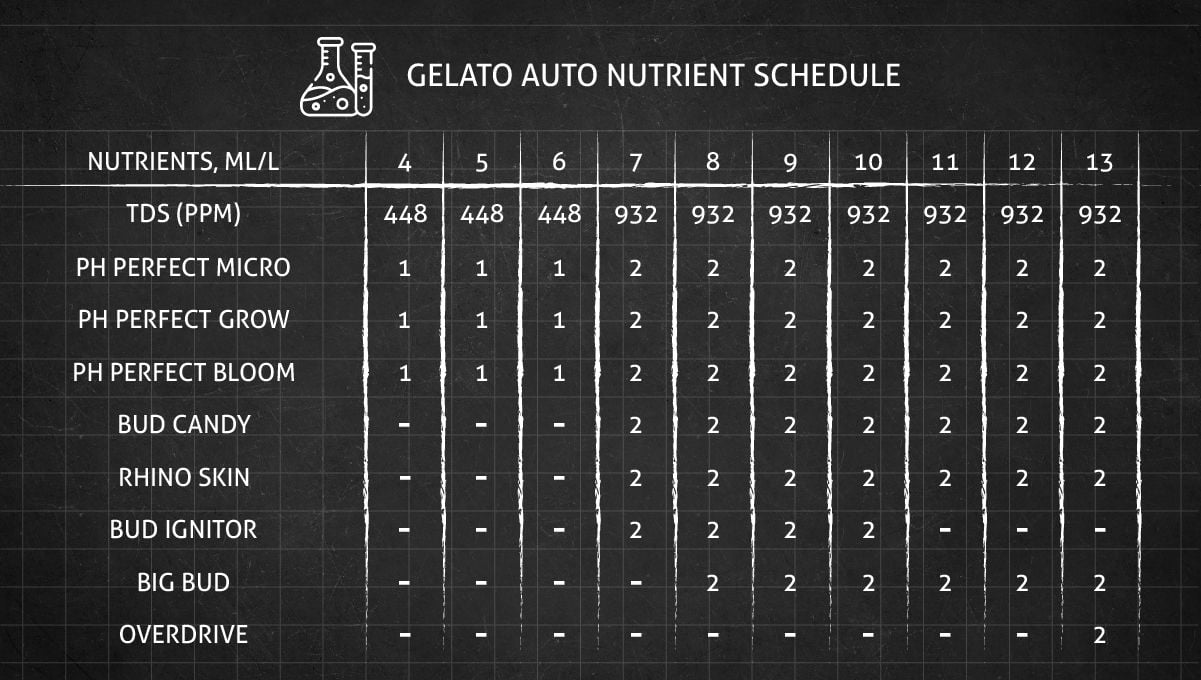
Gelato Auto obviously liked her food, her environment, her new-found vigor. She began to flower for real around this time. There was a lot of early-flower stretching, too.
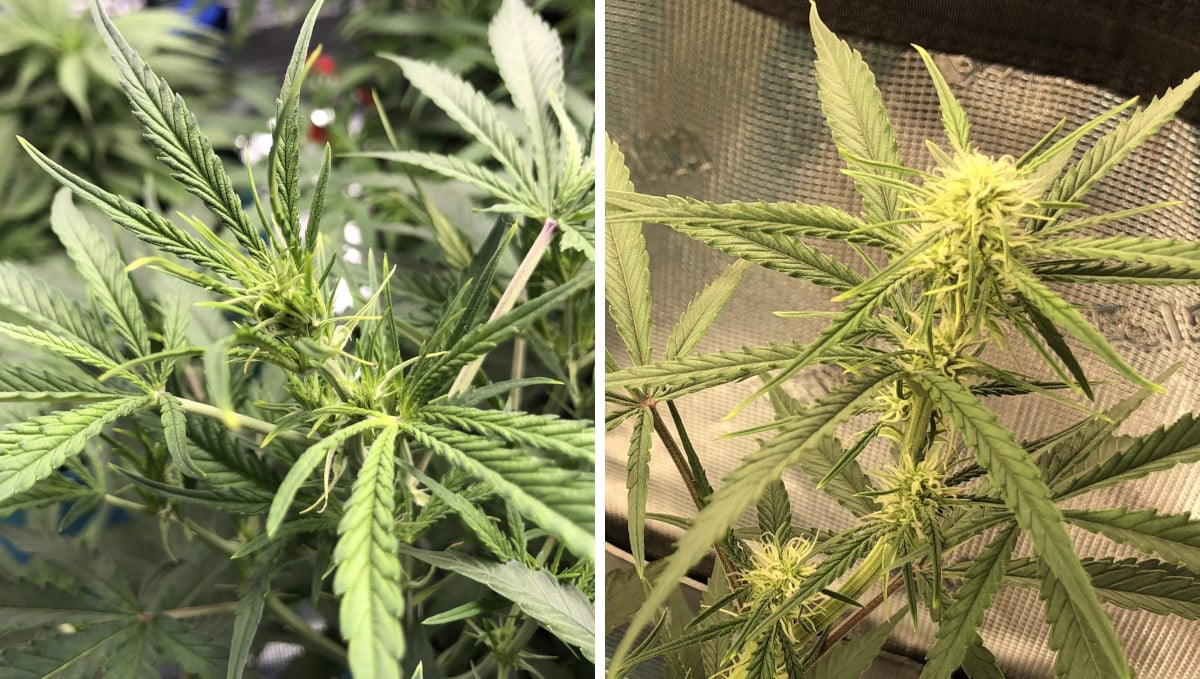
9. Ripening And Harvest | Week 10 (And Beyond)
Gelato Autoflower week by week progress was quite uniform in three out of four grow cycles. All three took exactly 12 weeks from seed to harvest. The fourth one—which was stressed in the beginning—needed two more weeks to mature. Nevertheless, the results were spectacular in every case.
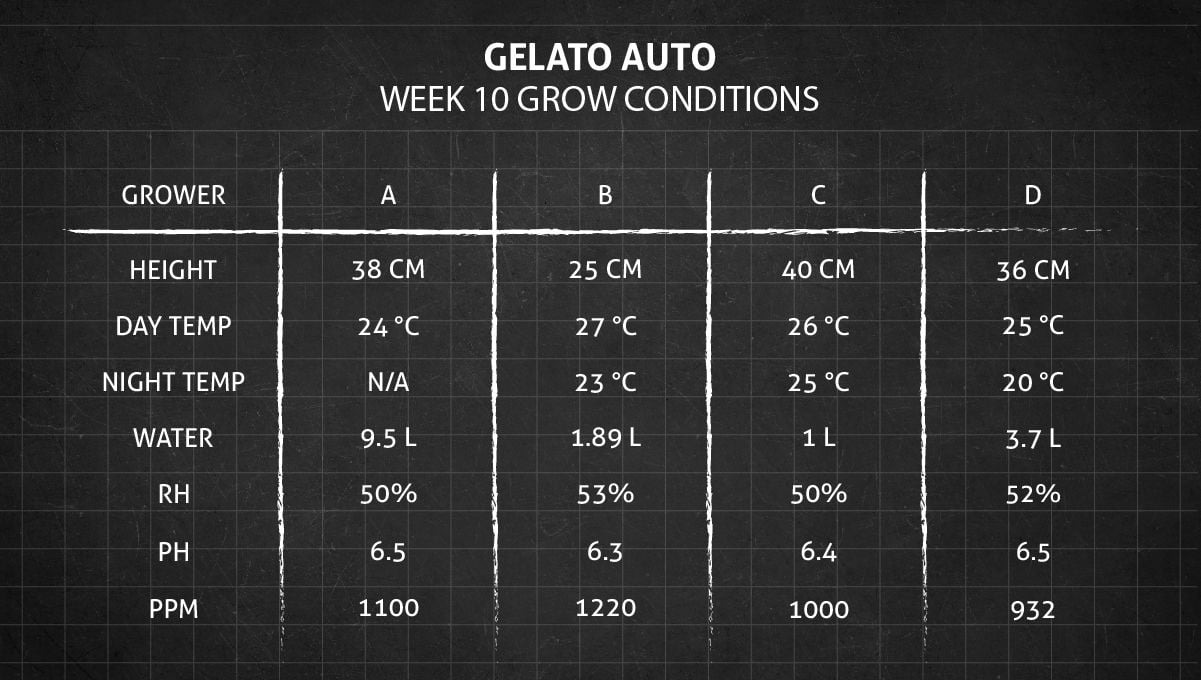
A: Some Healthy Stress Before Harvest
In week 10, all leaves were covered with frost, and the smell was pure orange, especially if you touched anywhere on the plant. Though the grower kept PPM at a steady 1000, the run-off kept creeping up every time. The girl was obviously eating less and less now.
The only issue with her was that she sank in the pot and the lower branches were now underwater during every feeding. The grower also had a hard time trimming anything close to the ground. Or removing the trim afterwards.
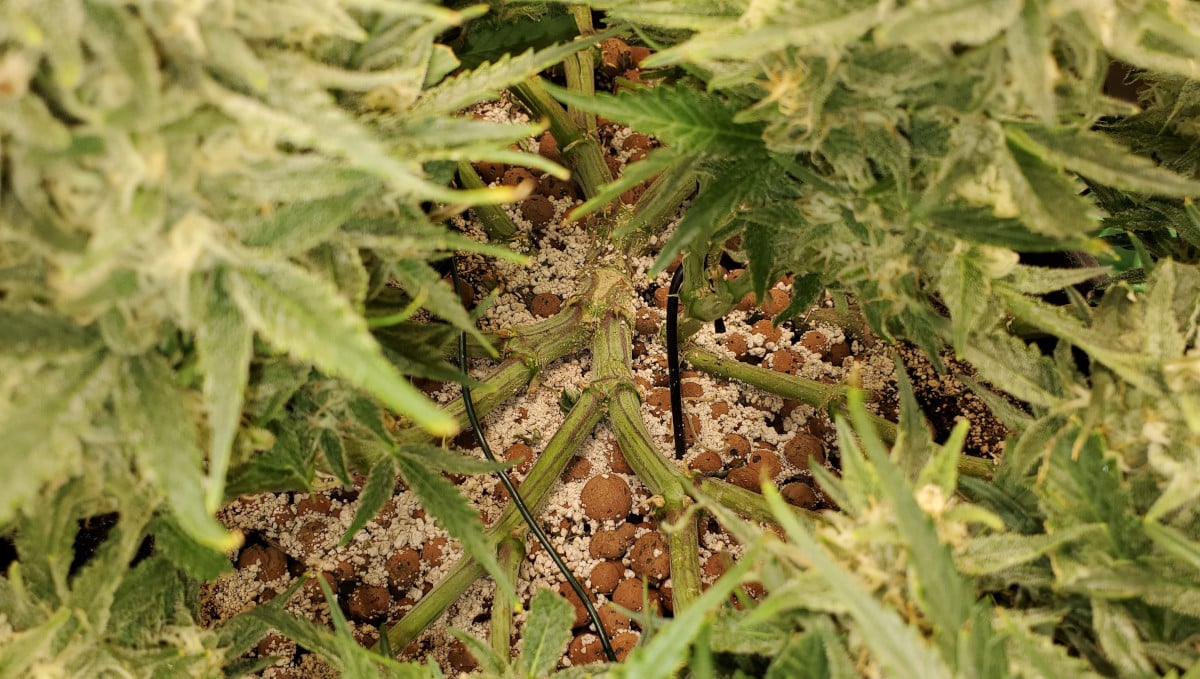
In week 11, the only meal Gelato Auto was getting was water: at first 3 gallons every other day, then a flush with 15 gallons. She was also transferred (alone) into a small 3’x3’ tent in the garage where day temperature was as low as 15°C (55°F) with a not so low RH of 50%. Obviously, the guy had much confidence in Gelato’s resistance to mold.
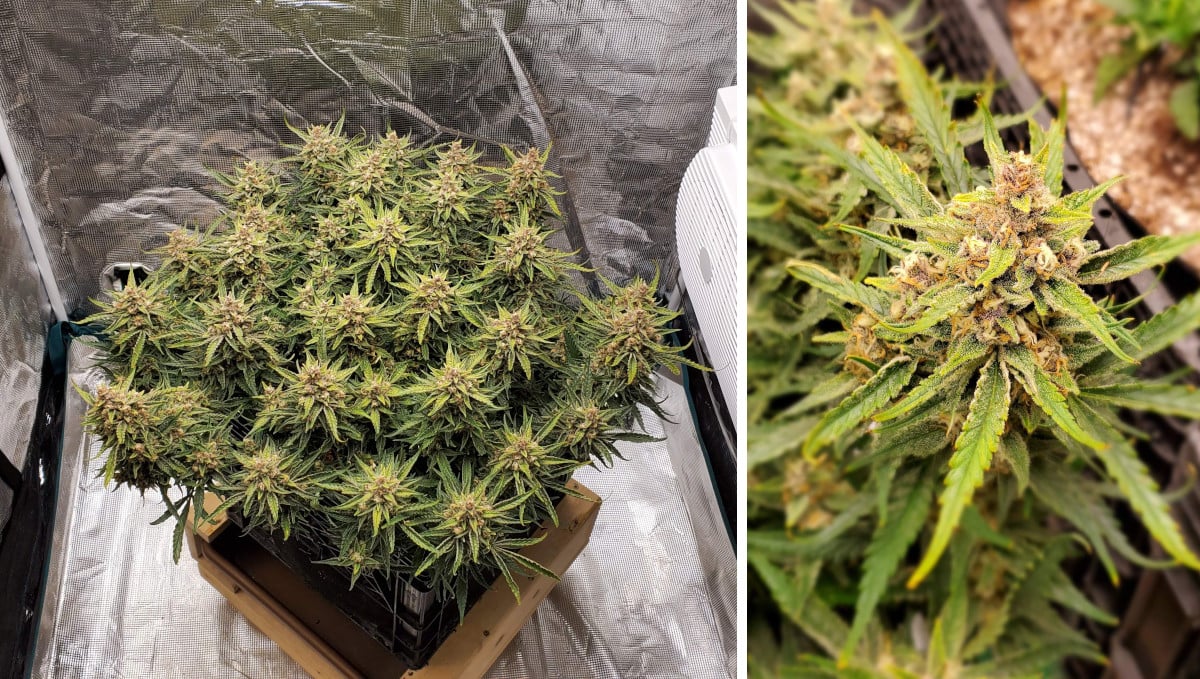
In week 12, the flushing was over, and the plant only received a bare minimum of tap water (1 gallon every 4 days), just not to suffer from thirst.
On day 83, the lights were off, and the lady had her couple of days of beauty sleep in darkness. The guy wasn’t sure this method worked, but he had been doing this from the first run and didn’t want to change this routine.
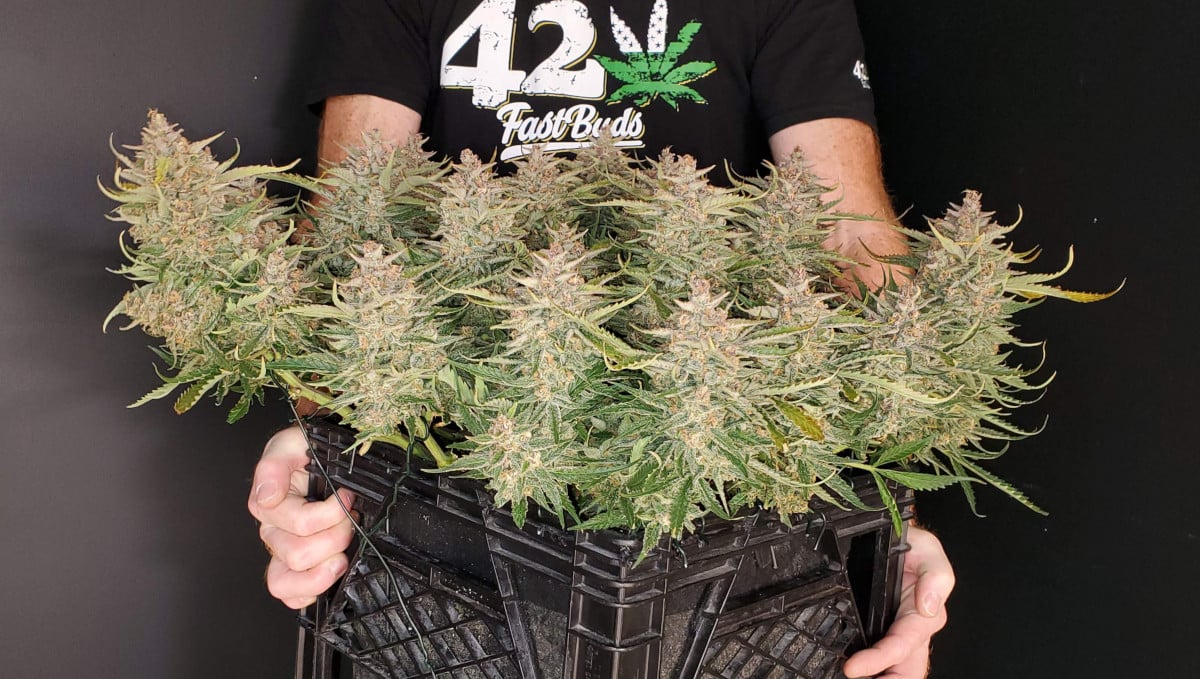
After the finishing treatment with darkness, Gelato Auto was harvested.
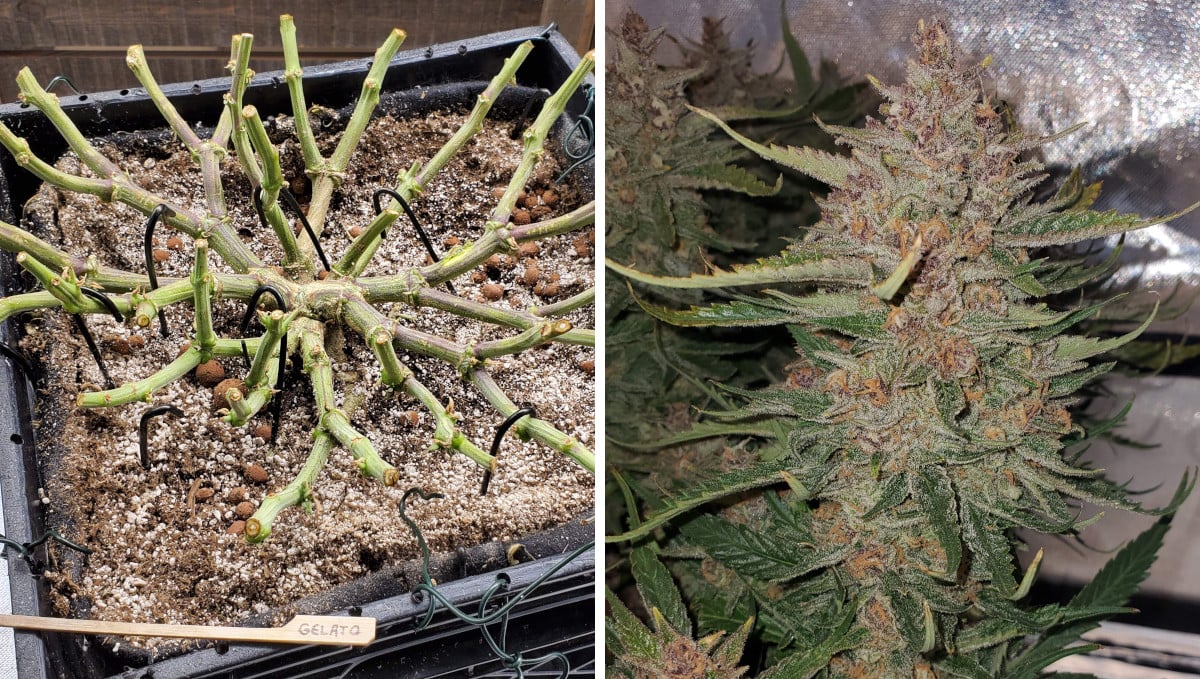
B: A Three-Week Wait for Amber Trichs
The start of week 10 was the last time Gelato Auto received any nutrients. From now on it would be either tap water or FoxFarm Bush Doctor Sledgehammer. This flushing product is meant to remove excess salts from the medium and the plants. In soil, you need about two weeks of flushing to get a perfectly clean smoke.
All through the 10th week, the trichomes changed from clear (immature) to cloudy (highest THC content), but the grower wanted many of them to turn amber. He just liked the couch lock in the evening, and, besides, the more sedating smoke helped with his back. So he settled for a couple of weeks’ wait.
Only in week 12, the flushing reached the point where the runoff dropped to almost nothing (223 PPM) and the fan leaves began to yellow a bit. The guy was still waiting for the perfect amber-to-cloudy ratio of the trichomes. But every time he thought the end was near, his Gelato Auto threw ‘a million more clear trichs’ at him.
Anyway, when 12 full weeks from seed to harvest were over, he finally chopped.
In case you're curious about the final sizes of all plants in our growing guide, here's the complete chart from week 1 through 8 (when Gelato Auto usually stops stretching).
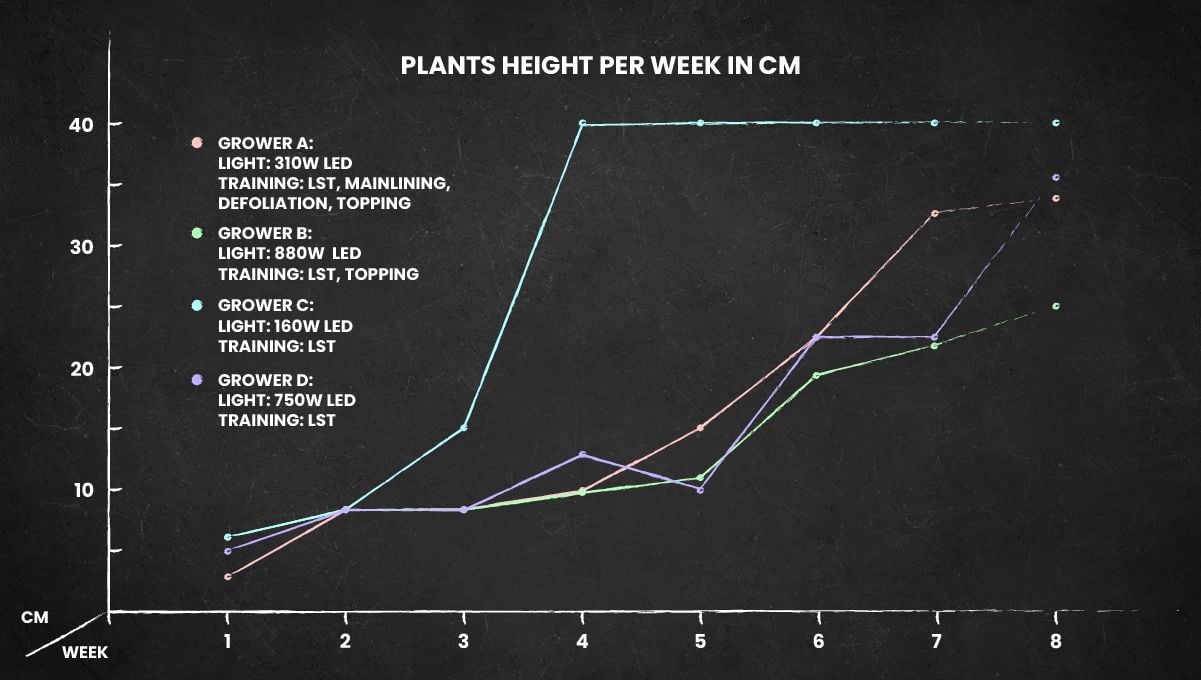
C: Watching for Signs of Maturity
Week 10 was the last when this Gelato Auto received any plant food. The grower measured the runoff and found it to be too much at 1300 ppm. He thought this was the reason some leaf tips had burned.
So, for the next two weeks—while he was checking the buds using a microscope—he fed Gelato Auto only pH’d water and nothing else. Most of the trichomes remained clear for a long time. Only some of them were getting milky, and a few amber ones were probably from the light burn.
Anyway, the amount of frost was stunning—nothing the guy had experienced with any other strain before. Naturally, a plant so resinous was also extremely aromatic—she smelled sweet and sour like a lemon tart.
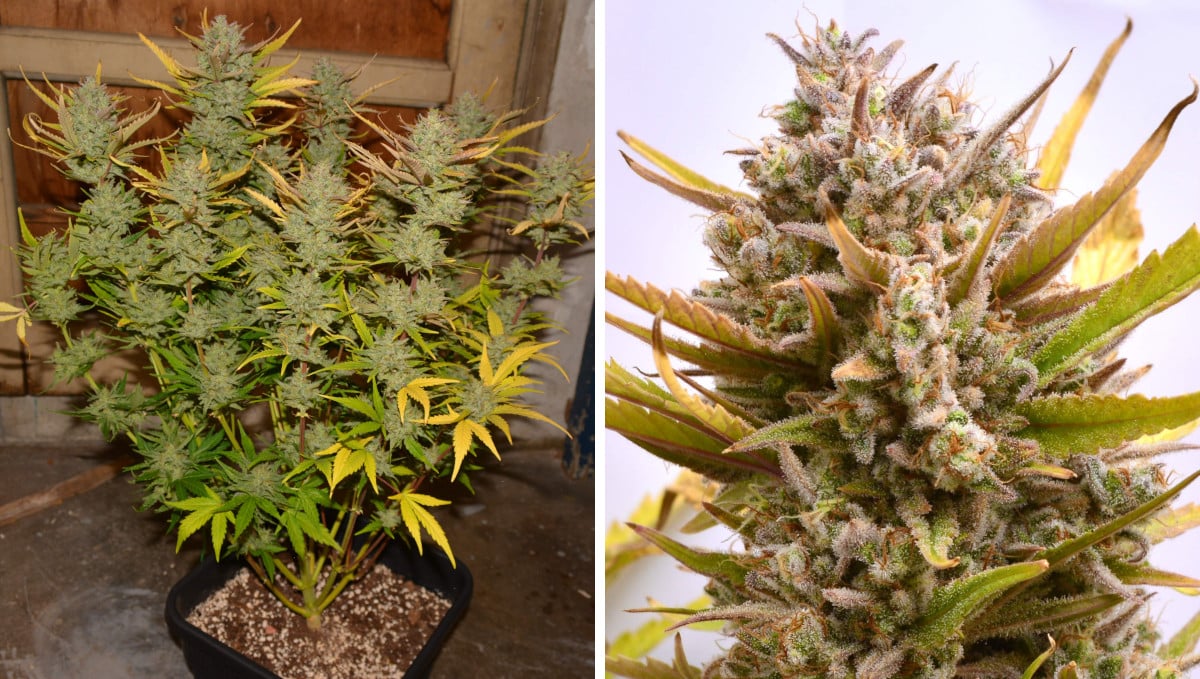
D: Getting More Beautiful With Every Passing Week
With the nutrient schedule all dialed in and the canopy in its final perfect shape, there wasn’t much the grower could do but continue with watering/feeding and enjoy the beauty of his Gelato Auto. Which, all in all, took about a month.
The lady was filling out nicely, and around week 12 some purple colors appeared in the buds. This hue was, however, almost totally concealed by the thick white coat of ‘frost’.
In week 13, the guy boosted his feeding solution with Overdrive to make the colas swell up some more. After that, Gelato Auto received only Flawless Finish, an Advanced Nutrients flushing product which cleans the buds from unwanted, potentially harmful salts.
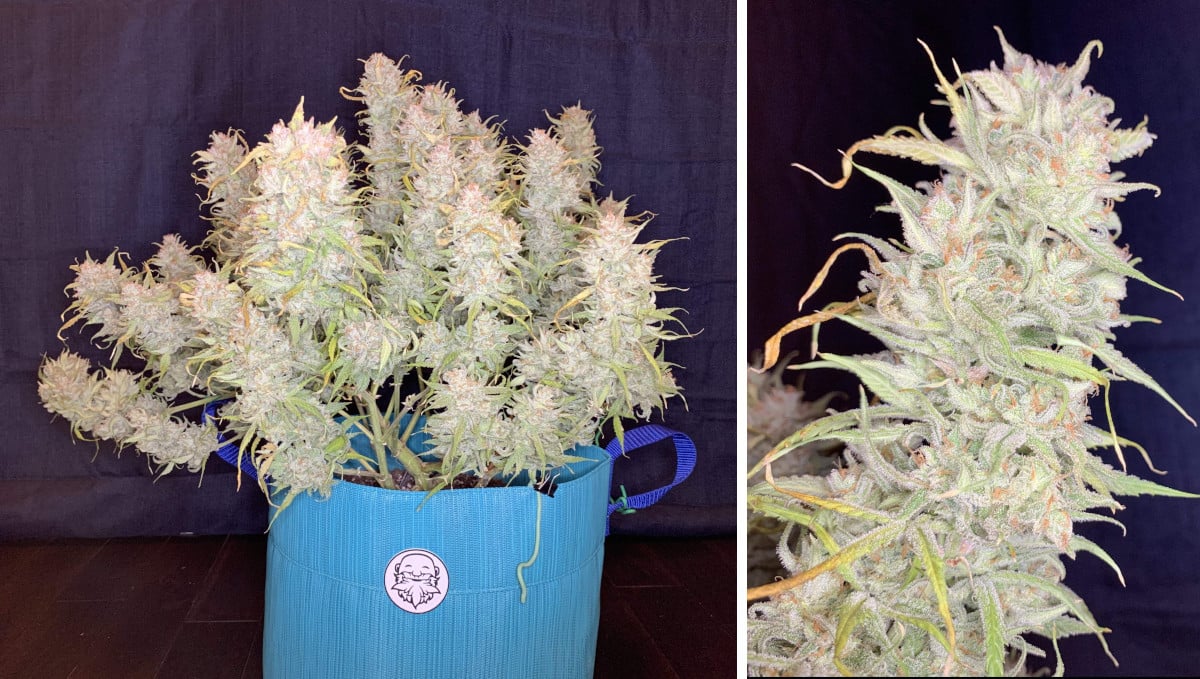
The trichomes become mostly milky, with some of the amber ones here and there, marking the perfect window for the harvest. Which the grower performed, but only after he gave his lady the final treatment with 36 hrs of darkness—to stress her into producing even more trichs.
9. The Outcome
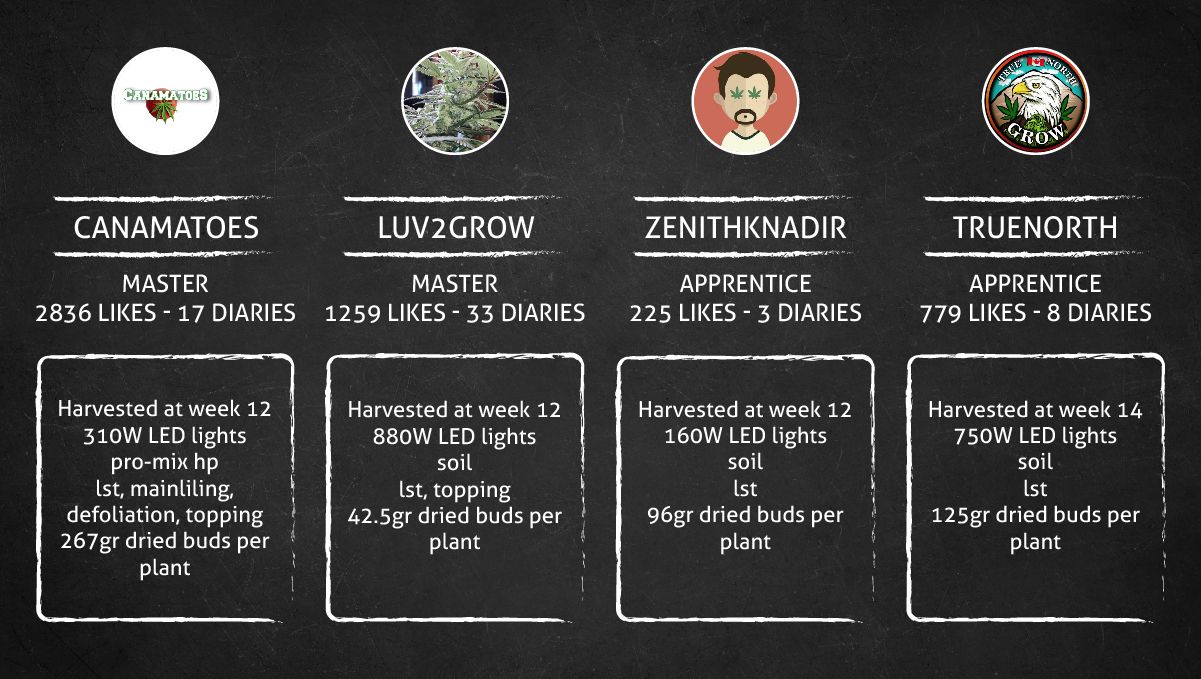
Gelato Auto Yield
Canamatoes grew just one plant, but she was so gigantic, the guy harvested 267g (9.43oz) dry. He described the buds as huge and dense, and, thanks to mainlining, there were many of them, and all of the same size. In the picture below, you can see just a TINY part of the harvest.
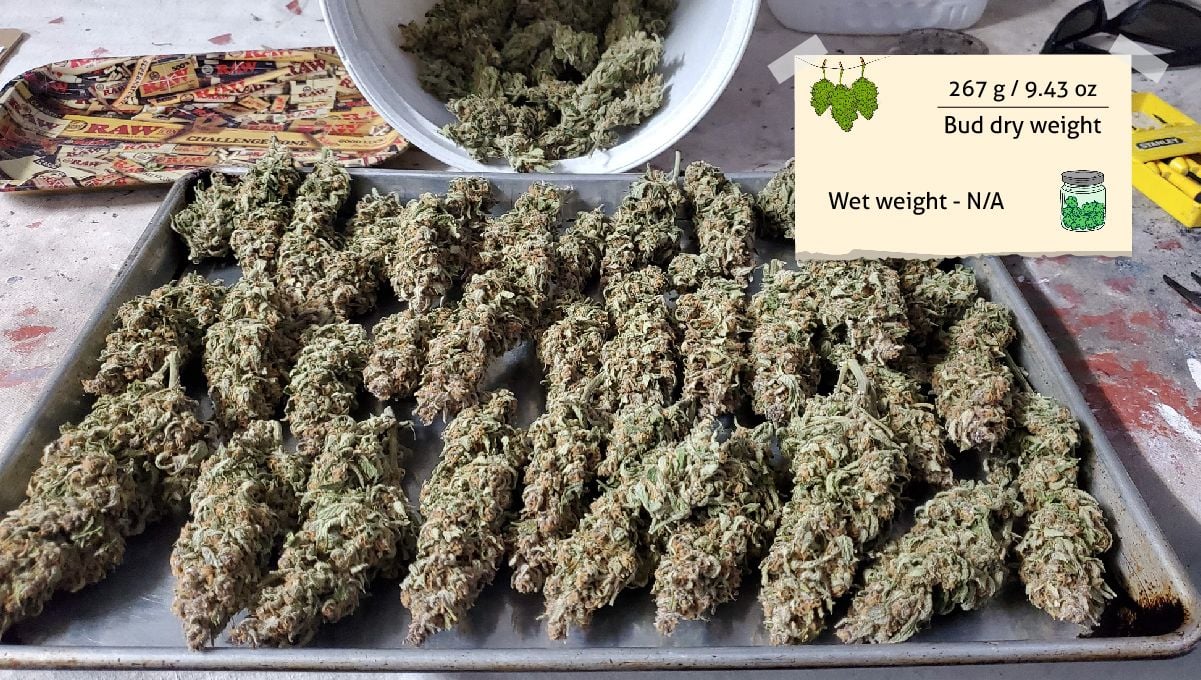
Luv2Grow’s Gelato Auto was quite small but yielded 42.5g (1.5oz) in 12 weeks from seed. He could have gotten the same results two full weeks earlier if he didn’t wait so long for more amber trichomes. The buds were chunky and heavy and extremely resinous.
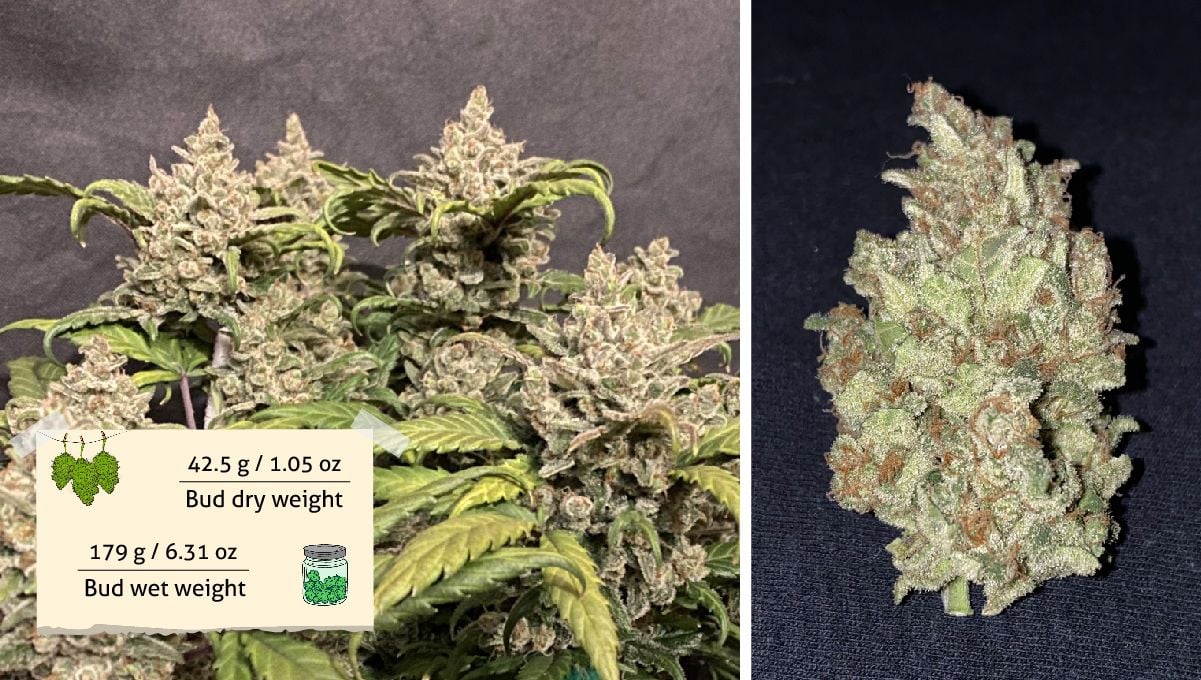
For zenithknadir, Gelato Auto was one of two plants in a DIY tent under a custom-made 160W LED, but together they brought 186g of premium bud, with Gelato yielding slightly more than her roommate—96g (3.39oz).
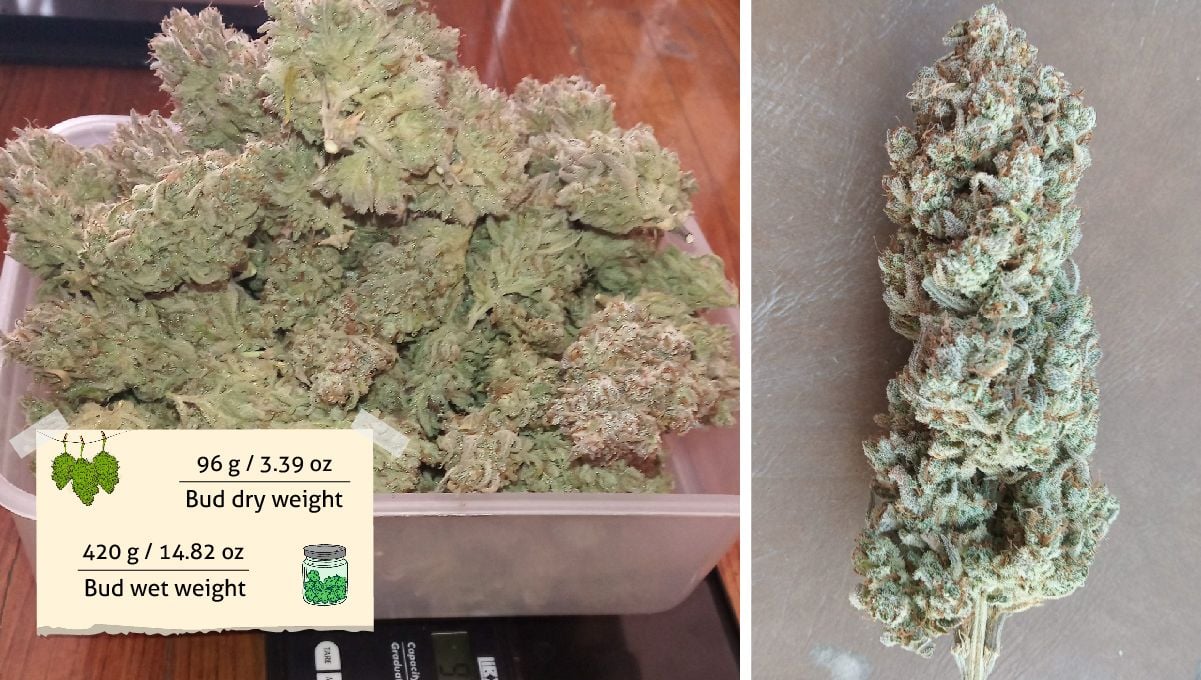
TrueNorth had to wait 14 weeks for his Gelato Auto to finish her life cycle, but every extra day was worth it because his final haul was 125g (4.41oz) from just one plant. And it was top-shelf material, both in terms of smell/taste and the quality of the high.
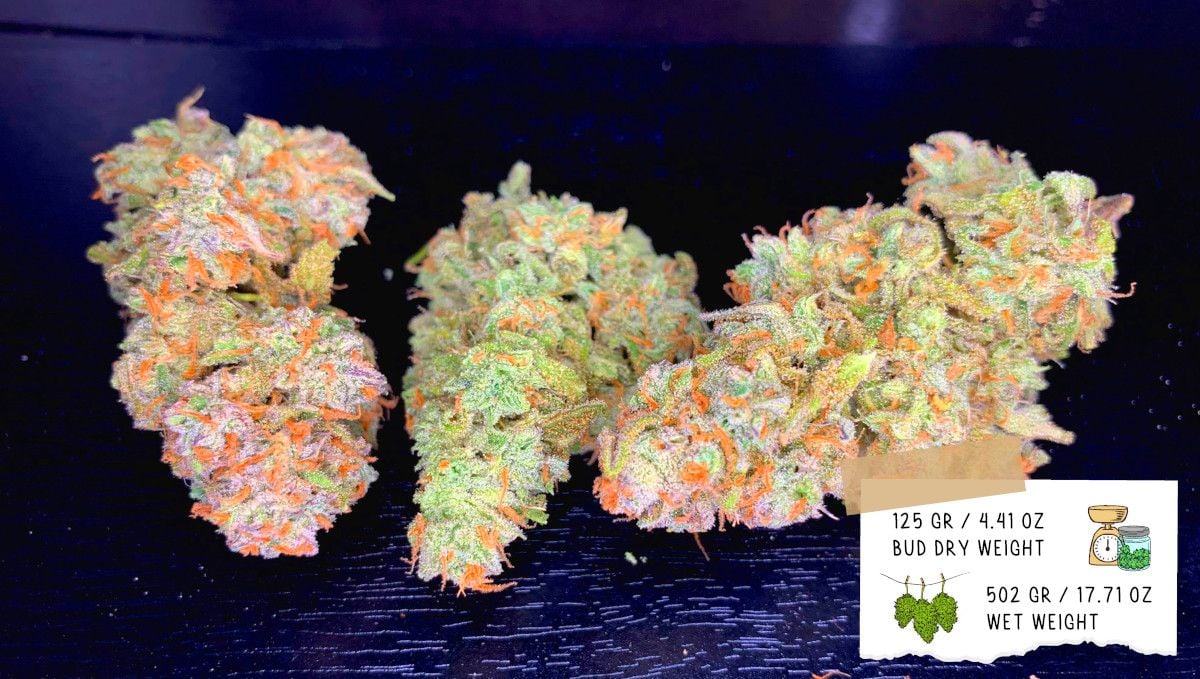
Gelato Auto Smoke Report
Canamatoes kept his buds in plastic buckets, burping them twice a day, and each time he was overwhelmed by an intense aroma. A test smoke—after just one week of drying—had already a great promise: a smooth flavor of cookie dough and citrus and a high that was strong after one hit and super strong after three.
Luv2Grow tested two small buds after 6 days of drying, and it was one of the smoothest and tastiest smokes he’d had in a long time. It had a taste that almost resembled orange sherbet and left an aftertaste that seemed to be a mix of many different fruits. The effect was a nice relaxing high with a delightful laughing fit 15 minutes in.
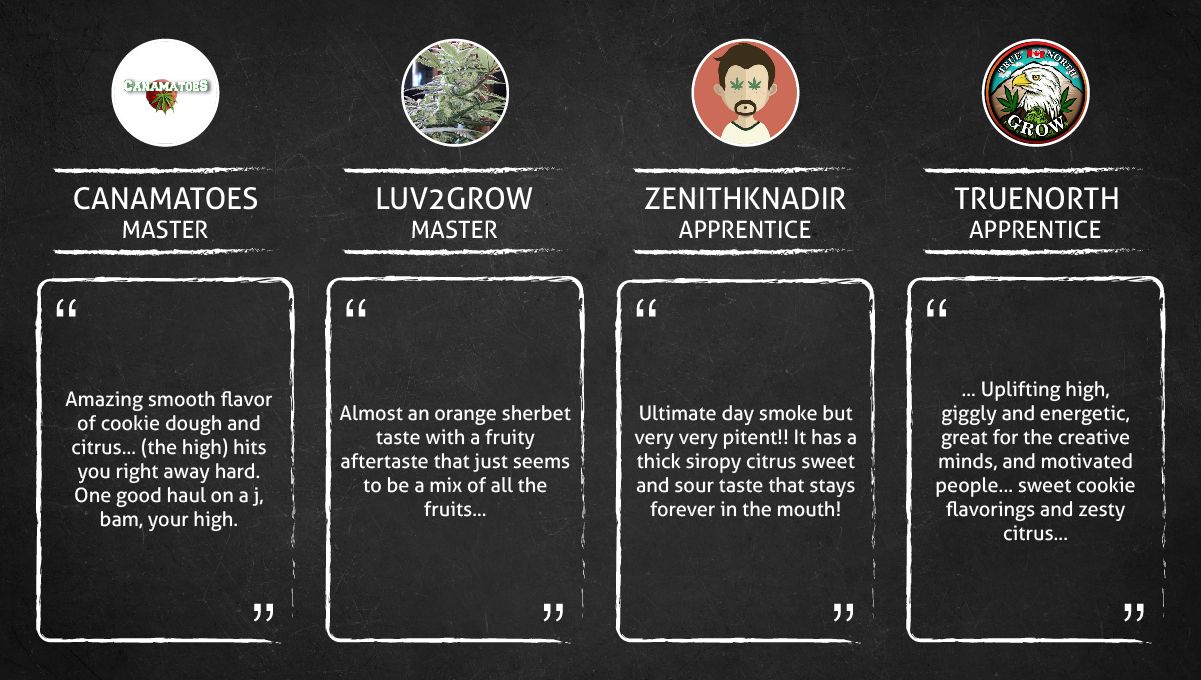
Zenithknadir was ecstatic about the quality of his Gelato Auto which he characterized as the best genetics he had ever grown. Though extremely potent, this was the ultimate day smoke because, after 20 minutes or so when you felt numb in both your head and body, you suddenly felt a surge of energy and the desire to do things and be creative. The taste was both sweet and sour like syrup and citrus and very long-lasting.
TrueNorth called these genetics a masterpiece. He was lucky to grow himself a sativa pheno with a phenomenal THC content and a very uplifting, creative, and motivating high. The gassy smell and the taste of sweet cookies and citrus were also top-notch.
10. In Conclusion
Now that we have followed Gelato Auto progress through all grow stages, we can sum up the main features of this cultivar and, hopefully, give you some guidelines.The strain shows an impressive resistance to stress. This means that you may start her in a solo cup and transplant her into a bigger pot as needed. You may also use such high-stress training techniques as topping, FIMming, or mainlining. Just make sure to start any of these procedures BEFORE the flowering time begins.
Gelato Auto is also an incredibly resinous strain of weed. Don’t let this fool you. Judging by the amount of frost, you may THINK that the buds are ready for harvest, but a couple of more weeks will make a hell of a difference (both in terms of yield and the THC/terpenes production). Other than that, Gelato Auto is one of those plants that grow by themselves. Meaning that even a first-timer can be sure of a harvest, and if you already have some experience, you can produce commercial amounts of super potent buds with a unique and universally pleasing flavor. Happy growing, everyone!
External References
- Are researchers getting the terms used to denote different types of recreational cannabis right?—a user perspective, Journal of Cannabis Research, 2021
- The preservation and augmentation of volatile terpenes in cannabis inflorescence, Justin Bueno et al., 2020
- Relationship among subjective responses, flavor, and chemical composition across more than 800 commercial cannabis varieties, A. de la Fuente et al., 17 Jul 2020
- High Light Intensities Can Be Used to Grow Healthy and Robust Cannabis Plants During the Vegetative Stage of Indoor Production, Melissa Moher et al., Preprints 20121









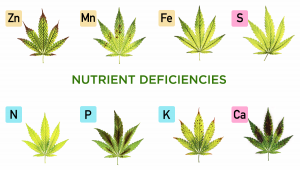
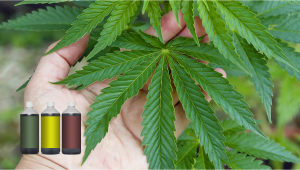



Comments